Don't have an Account? Register Now!

Forgot Password
1 Visiting a Travel Agent
2 Making a Plane Reservation
3 Booking a Flight Online
4 Buying a Plane Ticket
5 Making a Hotel Reservation
6 Getting a Passport
7 Luggage Limits
8 Carry-on Luggage
9 Dropping Off at the Airport
10 Picking Up at the Airport
11 Going through the Customs
12 Talking to a Curbside Agent
13 Talking to a Flight Attendant
14 Talking to a Seatmate
15 Ordering Food and Drink
16 Missing Connecting Flight
17 Ground Transportation
18 Arranging a Tour of the City
19 Complaining about a Tour
20 Sightseeing
21 Making Alternate Plans
22 Shopping for Souvenirs
23 Trying to Find a Doctor
24 Losing the Wallet and Passport
25 Being Cautious in a Big City
26 Local Customs
27 Shuttle Bus at the Airport

50 fun travel conversation questions
Travel conversation questions.
Free discussion worksheets with pictures to describe the topic of travel. Difficult words on this first printable include – pack, prefer, cruise, destination, thoroughly, gotten, accommodation, backpacking, international, furthest, and distance.
The travel conversation questions on worksheet 1 are –
1 – When was the last time you traveled? Where did you go?
2 – What is your favorite thing about traveling?
3 – Where would you like to travel to next? When do you think you will go there?
4 – How long can you travel before you start to miss home?
5 – What are the most important things to pack before you go traveling?
6 – What kinds of transport do you prefer to travel by?
7 – Are there any places in your country that you never want to travel to? Why not?
8 – Who in your family is the best person to travel with?
9 – Have you ever been on a cruise ship? Would you like to take a cruise?
10 – What kinds of activities do you like to do when you are traveling?
11 – Have you ever learned or tried to speak another language while traveling?
12 – What are the top travel destinations in your country? Have you been to them?
13 – How do you usually decide on a travel destination?
14 – Do you like to plan your travel thoroughly or just make it up as you go along?
15 – What do you think of backpacking? Would you like to try it?
16 – Have you ever gotten lost on your travels? What did you do?
17 – What kind of accommodation do you usually stay in when you take trips?
18 – What is the best way to keep your money safe when you go traveling?
19 – Have you ever felt scared or been in danger on your travels?
20 – How has COVID-19 changed travel in your country and internationally?
21 – Where is it your dream to visit? Do you think you will ever get there?
22 – What is the furthest distance you have ever been from your home?
23 – Do you prefer to travel alone, with friends , or with family?
24 – What is the first thing you do when you arrive in a new city?
25 – Do you use any websites or apps when you travel? What for?
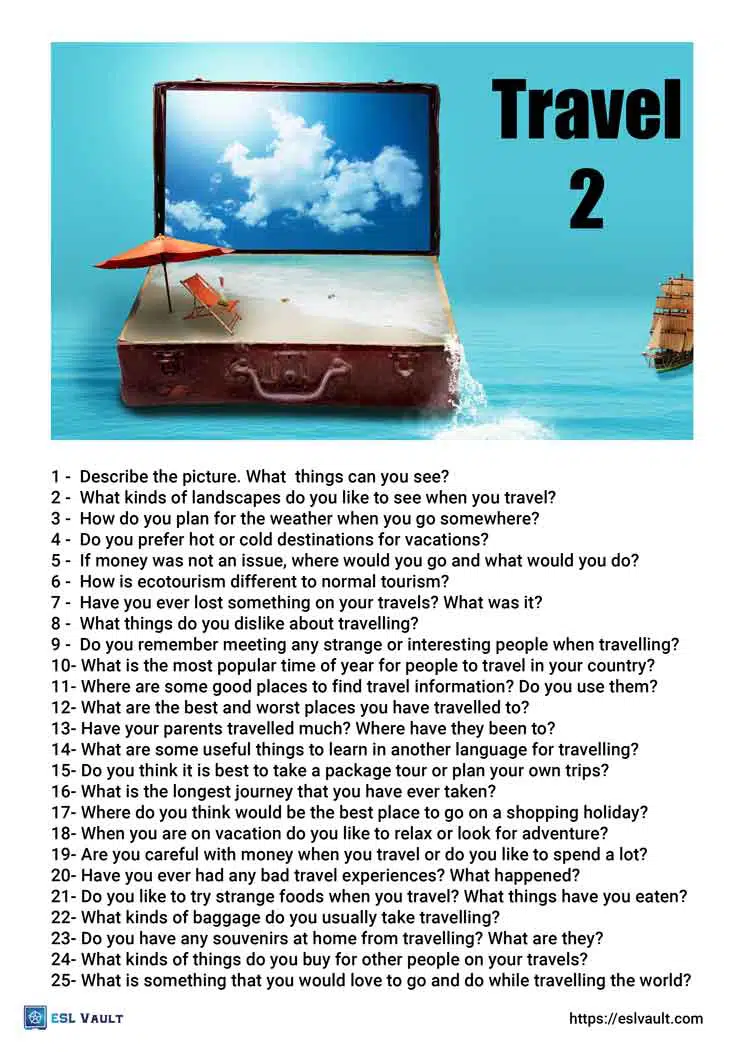
Travel conversation questions 2
Before starting the discussion with this second set of questions, be sure the students are familiar with the terms – landscape, ecotourism, issue (problem), journey, baggage, and souvenir.
On this second worksheet, the travel conversation questions are –
26 – What kinds of landscapes do you like to see when you travel?
27 – How do you plan for the weather when you go somewhere?
28 – Do you prefer hot or cold destinations for vacations?
29 – If money was not an issue, where would you go and what would you do?
30 – How is ecotourism different to normal tourism?
31 – Have you ever lost something on your travels? What was it?
32 – What things do you dislike about traveling?
33 – Do you remember meeting any strange or interesting people when traveling?
34 – What is the most popular time of year for people to travel in your country?
35 – Where are some good places to find travel information? Do you use them?
36 – What are the best and worst places you have traveled to?
37 – Have your parents traveled much? Where have they been?
38 – What are some useful things to learn in another language for traveling?
39 – Do you think it is best to take a package tour or plan your own trips?
40 – What is the longest journey that you have ever taken?
41 – Where do you think would be the best place to go on a shopping holiday?
42 – When you are on vacation do you like to relax or look for adventure?
43 – Are you careful with money when you travel or do you like to spend a lot?
44 – Have you ever had any bad travel experiences? What happened?
45 – Do you like to try strange foods when you travel? What things have you eaten?
46 – What kinds of baggage do you usually take when traveling?
47 – Do you have any souvenirs at home from traveling? What are they?
48 – What kinds of things do you buy for other people on your travels?
49 – What is something that you would love to go and do while traveling the world ?
50 – What is the best photograph that you have taken while traveling? Where were you?
Related activities
For further discussion you may want to use the transport conversation questions or the airport conversation questions . There are also transport and airport activities in the vocabulary worksheets archives.
For talking about weather and cities around the world there is also the weather pair work speaking activity.
You might also like these
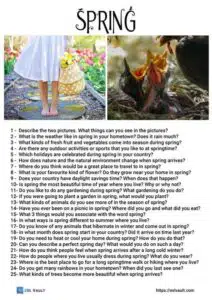
25 spring conversation questions

25 gambling conversation questions
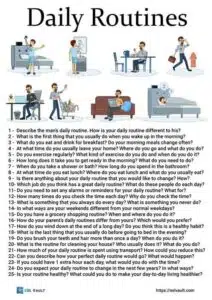
25 daily routine conversation questions
Free ESL and English teaching resources, no sign up required. Just find what you like, download it and head to class!
Privacy Policy
Share ESL Vault with your friends!
- Writing Worksheets
- Vocabulary Worksheets
- Pronunciation
- Kids worksheets
- Idioms and Expressions
- ESL Puzzles
- ESL Pair Work Activities
- ESL Conversation Questions
- Coloring Pages
- Articles, Lists and Ideas
- Art and Craft Activities
- Excellent ESL 4U Blog
- ESL Learning Tips
- Free ESL Book
- ESL Conversations
- ESL Conversation Cards
- 80 Conversation Cards
- ESL Flashcards
- ESL Listening
- ESL Reading
- ESL Vocabulary
- ESL Writing
- Free ESL Worksheets
- ESL Printables
- Idioms Worksheets
- ESL for Kids
- ESL Kids Vocabulary
- ESL Kids Worksheets
- ESL Games for Kids
- Wordsearches for Kids
- Kids Alphabet Writing
- About Excellent ESL 4U
- Privacy policy
ESL Travel Conversation
You will often need to speak to people when travelling, these ESL travel conversations are examples of natural English travel conversations. They will help you by showing the type of thinks people would say to each other.
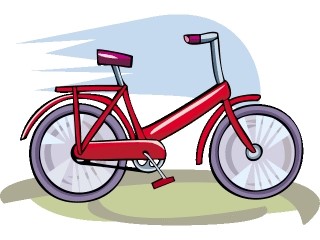
This page has two example travel conversations, both of which have been made into short videos. If you need any help understanding the vocabulary used in the example conversations or the cartoon videos then you can visit the ESL travel vocabulary page for definitions of many of the travel words used.
There are then 3 ESL travel conversation exercises for you to do that will help you practice using travel English. They are:
- A conversation where you have to fill in the blanks.
- Writing your own conversation.
- Some conversation topics so you can talk with your friends.
Conversation 1
Situation: Patrick, Andrew and Jane discuss how to travel to the city from the university campus.
Jane: Good morning, Andrew. Andrew: Good morning, Jane. Are you going somewhere? Jane: Yes. I and Patrick are going to the city to do some shopping and have lunch. Andrew: That sounds fun. How will you get there? Patrick: I want to take the train, but Jane prefers to ride her bicycle. Andrew: Don’t you like using the train, Jane? Jane: The train station is far away and riding my bicycle does not cost anything. Patrick: Ok. Jane, why don’t we travel by bus, there is a bus stop just behind the university. Jane: It might take longer. I think we will need to take two buses to the city centre. Andrew: Jane is right. There is not a direct bus into the city. Why don’t you use a taxi? Patrick: That will be quick, but expensive. Can you rollerblade? Jane: I hope you don’t mean we should rollerblade to the city. Andrew: Is rollerblading popular in America, Patrick? Patrick: Yes. People often use roller-skates. There is even a designated lane for it. Jane: In UK we can’t do that, the path is just for walking on. Andrew: I need to go to the train station to buy some tickets. I can give you both a lift in my car. Jane: That would be wonderful, Andrew. Thanks so much. Patrick: That is very kind of you, Andrew. Let’s go to the city centre!
Conversation 2
Situation: Tui talks with Lucy about her plan to go back to Thailand during half term.
Lucy: What are you doing, Tui? Tui: I’m planning my trip back to Thailand for the mid-term break. Lucy: That sounds exciting. Tui: Not really. I must do a lot of travelling to get back to my home. Lucy: Really? Why? How will you get home and how long will it take? Tui: It will take more than 24 hours because I have to use many different types of transport. Lucy: Will your family meet you at the airport in Thailand? Tui: No. I must take a bus from the airport to my home. The bus is very uncomfortable. Lucy: That does not sound nice. How will you get to London Heathrow airport? Tui: I think it will be cheapest to use the coach, but I have a lot of luggage. Lucy: That’s ok. Usually you can pay extra to take more luggage. Tui: Really? That’s good. Do you know where the bus station is from here? Lucy: Yes, you can walk there. It will only take you 5 minutes. Tui: Should I buy a ticket before travelling? Lucy: Buy your ticket online if you can. It is always cheaper online. Tui: I want to travel direct to London. Do they have direct buses to the airport? Lucy: Yes, it takes about 2 hours. Tui: Perfect! I will take the bus. I was thinking about a taxi, but it’s expensive. Lucy: So, when is your flight? Tui: Tuesday morning. I need to leave really early as I must check in three hours before. Lucy: Would you like to take some of my delicious homemade cake for your family? Tui: Thanks, Lucy. But I don’t think I can. The customs officer is usually really strict. Lucy: I understand. Have a safe journey and see you when you get back. Tui: Thanks, Lucy. See you soon!
ESL Travel Conversation Exercises
The 3 following ESL travel conversation exercises will help you get better at using English to have a conversation about traveling.
Exercise 1 – Fill in the Blanks
In this ESL travel conversation exercise you need to choose the correct option (A-D) to fill in each of the blanks in the following conversation. Once you have chosen the option to fill each blank just click on the get results button to show your score and the correct answers.
Situation: Bob travels by bus to the city centre.
Bob: Excuse me, driver. _____(1)_______. Driver: Yes. We go directly to the city centre. Bob: That’s great. I would like one ticket, please. Driver: _______(2)__________. Bob: No, I don’t. Driver: ________(3)___________. Bob: I would like a return ticket please. Driver: That will be 2.40, please. Bob: Here you go. ______(4)________. Driver: Yes, please press the buzzer when we get near, there is a bus stop opposite the mall. Bob: Thank you. How often do the return buses leave and when is the last bus this evening? Driver: Buses run every hour and the last bus is at 2 am. Bob: Thank you. You have been very helpful. Driver: You are welcome. No problem at all. ________(5)_________.
ESL Conversation
Exercise 2 – write a conversation.
For the second ESL travel conversation exercise you need to write a conversation that is similar to the ones above. You can chose what happens and how many people there are, but it should be related to travel. Write what each person would say to the other people. Once you have finished you should find a friend and then you can speak the conversation out loud to each other.
Exercise 3 – Conversation Topics
In this exercise there are two sets of ESL travel conversation topics. Working with a friend you should have a conversation where you answer the question. One person has set A and askes those questions to the person who has set B. Take turns to asks questions.
The questions have also been made into some conversation cards for you to download by clicking the picture.
Do you want to practice speaking more? Then download my ‘ 80 ESL Conversation Cards ’ ebook that has many more conversation questions.
Question set A
- What is the longest journey you have ever taken?
- Would you like to be the captain of a ship, why?
- How many different types pf transport have you ever used?
- Is it safe to travel in the country you come from?
- Have you ever had an accident while travelling?
Question set B
- Do you like travelling? Why?
- What do you like to do while travelling?
- Would you like to be the captain of an airplane, why?
- What is your favourite method of transport?
- Do you get ill when travelling?
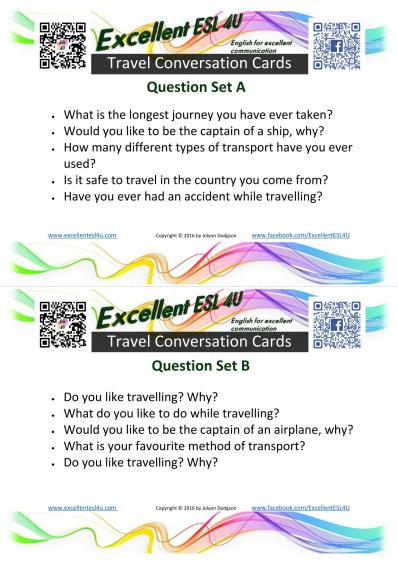
Other Pages about Travel that You Might Like
ESL Travel Listening ESL Travel Reading ESL Travel Vocabulary ESL Travel Writing
Excellent ESL 4U
New! Comments
Learn english, english idioms, kids english, contact excellent esl 4u, site information, recent articles, esl new year listening.
Dec 18, 16 03:17 AM

There are several ESL New Year listening tasks for you to do on this page so you can learn how to listen to the vocabulary.
ESL New Year Writing
Dec 11, 16 03:40 AM
This page has a range of ESL New Year writing exercises for you to do.
ESL New Year Conversation
Dec 04, 16 02:07 AM

There are example ESL New Year conversations on this page as well as some exercises and activities.

By Jolyon Dodgson , copyright © 2014-2020
www.excellentesl4u.com
Image © Graphics Factory.com

61 Questions About Travel: The perfect English Conversation Practice
Have you ever been stuck for words when a friend told you they took a trip or a vacation? Be stuck no more! These 61 questions about travel can be used as an English conversation practice – letting you work on your speaking and vocabulary!

Travel questions: A good way to boost our English fluency!
Here is why asking questions about travel , generally talking about it, and being enthusiastic about it, is a handy English conversation practice, and a good way to boost our English fluency:
- Expands Vocabulary: We can learn new words and phrases related to destinations, activities, and cultures!
- Enhances Speaking Skills: Helps us practice and improve our English speaking skills, such as pronunciation, fluency, and expressing ideas clearly.
- Builds Confidence: Talking about travel topics encourages us to communicate with others, boosting our confidence in using English.
- Cultural Awareness: Exploring different travel experiences helps us understand diverse cultures, traditions, and perspectives.
So, without further ado, let’s jump right into today’s travel questions. Remember – try to answer the questions as best you can!
Questions about travel
Here are the first of our questions about travel . They are easy and simple for beginners and focus on the past tense.
- Where did you go?
- What did you do?
- Who did you go with?
- What did you eat?
- Whose idea was it to travel there?
- How was the weather?
- What was the hotel like?
- How were the people?
- Was it a safe place?
- Was it an expensive place?
- Did you try to speak the local lingo?
Related: 61 Hypothetical Questions For ESL: Native English Speaking Practice
Questions about travel: Travel likes and dislikes
Here are 10 questions about travel that focus on preferences. These are things we like better. This is a great English conversation practice for general discussion – we don’t even need to have recently traveled to use these questions!

- What are some things you enjoy about traveling?
- Is there anything you don’t like about traveling? Why?
- Do you prefer visiting busy cities or quiet countryside destinations?
- What kind of weather do you prefer when you travel? Why?
- Are you an adventurous eater when trying new cuisine during your travels?
- Do you enjoy exploring famous landmarks or off-the-beaten-path locations more?
- What are some must-have items you always take with you when you travel?
- Are you a fan of souvenir shopping while traveling? Why or why not?
- Do you enjoy meeting new people and making friends while traveling?
- How do you feel about experiencing different cultures through local festivals and celebrations?
Questions about travel: About your next trip
These next travel questions are about future holiday plans. Exciting!

- Where are you planning to go on your next trip? Why did you choose that destination?
- Are you more interested in relaxation or adventure for your upcoming trip?
- What activities or attractions are you looking forward to during your next trip?
- Are you traveling alone or with friends/family on your next trip?
- What is the one thing you absolutely must do or see on your next trip? (For example, visit The British Museum )
- Have you already booked accommodations for your upcoming trip? If so, where are you staying?
- Are there any specific local dishes or cuisines you are excited to try during your next trip?
- What are some items you will pack in your suitcase for your upcoming trip?
- Do you have any specific plans or itinerary for your next trip, or will you go with the flow?
- How do you think your next trip will be different from your past travel experiences?
Travel questions: Past experiences
Here are some travel questions that focus on past experiences:

- What was the most memorable trip you have taken so far? Why was it memorable?
- Have you ever had any travel mishaps or funny incidents during your trips?
- What is the longest journey you have ever been on? How did you pass the time?
- Have you ever traveled to a place where you didn’t know the local language? How did you communicate?
- What is the most breathtaking natural scenery you have witnessed during your travels?
- Have you ever participated in any unique cultural traditions or festivals while traveling?
- Did you have any encounters with wildlife during your travels? Tell us about it!
- Have you ever experienced a major culture shock while visiting a different country?
- What travel destination exceeded your expectations the most? Why?
- Have you made any long-lasting friendships with people you met while traveling?
Questions about traveling: If you could…
The next questions about traveling use a particular structure. We use “if you could” to talk about things or wishes that are unreal – but we’d really like to do. For instance, I’d really like to speak 7 languages fluently!
- If you could travel back in time, which historical era or event would you like to experience?
- If you could become fluent in any foreign language instantly, which language would you choose?
- If you could travel with any famous person, who would you choose as your travel companion?
- If you could have a travel-related superpower, what would it be?
- If you could spend a year living and traveling in any country, which one would you choose?
- If you could only visit one more country for the rest of your life, which country would you pick?
- If you could stay at any luxury hotel or resort in the world, where would you choose to stay?
- If you could erase one travel memory from your mind and experience it again, which memory would it be?
- If you could write a travel book, what would be the focus or theme of your book?
- If you could travel anywhere in the world, where would you go and why?
Questions about travel: Problems
Travel is certainly fun and exciting, but let’s be honest: sometimes there are mishaps! For example, I once lost my wallet and spent 3 hours looking for it, and eventually found it in the hotel lobby. Lucky!
- Have you ever encountered any travel difficulties or challenges? How did you handle them?
- What is the most frustrating thing that has happened to you while traveling?
- Have you ever had any issues with lost luggage or delayed flights during your travels?
- What is your worst experience with accommodations while traveling?
- Have you ever missed a connecting flight or had to deal with travel delays? How did you cope with it?
- Do you have any tips or tricks for avoiding common travel problems?
- Have you ever faced a language barrier problem while traveling? How did you overcome it?
- What is the most uncomfortable transportation experience you have had during your travels?
- Have you ever encountered any dangerous situations or scams while traveling?
- How do you deal with homesickness or loneliness when traveling alone?
Questions about travel: a handy vocab and fluency exercise
I hope you have enjoyed today’s questions about travel , and have found them a useful English conversation practice! Here is a quick summary of why it’s so good to talk about this topic if you are an English learner:
- Talking about travel is a fantastic vocabulary and fluency exercise for English study.
- It helps us expand our word bank and become more confident in expressing ourselves.
- By discussing travel topics, we enhance our fluency, becoming better at articulating our thoughts and ideas.
- Furthermore, exploring travel-related questions encourages us to think creatively and critically while improving our overall language skills.
- In a nutshell, travel is an exciting and effective way for us to boost our vocabulary and fluency in English!
Even if you can’t travel anytime soon, the topic is always open for discussion – we can use ” If you could…” questions. There is always something to talk about when it comes to taking trips. Thanks for reading!
Leave a Comment Cancel Reply
Your email address will not be published. Required fields are marked *
Save my name, email, and website in this browser for the next time I comment.
Conversation Questions Travel

“The world is a book and those who do not travel read only one page.” Augustine of Hippo (354 – 430), theologian and philosopher
- April 8, 2021
- General English
Home » Travel
Latest lesson plans

LESSON OVERVIEW
This free ESL lesson plan on travel has been designed for adults and young adults at an intermediate (B1/B2) to advanced (C1/C2) level and should last around 45 to 60 minutes for one student.
Whether it’s exploring new places, or relaxing in familiar ones, everyone loves travelling. In fact, many people learning English are doing so for that exact reason. In the past, travelling to exotic locations was only for the super-rich. Now, with the expansion of budget airlines and cheap packages, the world is a lot more accessible to a lot more people. In this ESL lesson plan on travel, students will have the opportunity to discuss and express their opinions on issues such as how much they like travelling, the best places they have visited and different forms of travel.
This lesson plan could also be used with your students to debate these issues for World Tourism Day , which takes place in September. For more lesson plans on international days and important holidays, see the calendar of world days to plan your classes for these special occasions.
For advice on how to use this English lesson plan and other lesson plans on this site, see the guide for ESL teachers .
PRE-CLASS ACTIVITIES
Reading activity Before the English class, send the following article to the students and ask them to read it while making a list of any new vocabulary or phrases they find (explain any the students don’t understand in the class):
World of Wanderlust | The Top 25 Best Destinations in the World
The article provides descriptions of some of the most visited tourist destinations in the world. At the start of the class, hold a brief discussion about what the students thought about the article. Have the students visited any of these places? If so, what did they think about them? Which of the places on the list would they most like to visit and why? Can they think of any of the destinations that should not be on the list? Which other destinations should be on a list of the best destinations in the world?
Video activity To save time in class for the conversation activities, the English teacher can ask the students to watch the video below and answer the listening questions in Section 3 of the lesson plan at home. There are intermediate listening questions and advanced listening questions so teachers can decide which would be more appropriate for their students. Check the answers in the class.
The video for this class is called “The Point of Travel” by The School of Life which views travel as a kind of therapy that can help us with our emotional state of mind.
IN-CLASS ACTIVITIES
The focus in the class is on conversation in order to help improve students’ fluency and confidence when speaking in English as well as boosting their vocabulary.
This lesson opens with a short discussion about the article the students read before the class. Next, the students can give their opinion on the quote at the beginning of the lesson plan – what they think the quote means and if they agree with it. This is followed by an initial discussion on the topic including the benefits of travel, the student’s favourite holiday/vacation and the best places to spend a holiday/vacation in their country.
After this, students will learn some vocabulary connected with travel such as backpacking , off the beaten path/track and bucket list . This vocabulary has been chosen to boost the students’ knowledge of less common vocabulary that could be useful for preparing for English exams like IELTS or TOEFL. The vocabulary is accompanied by a cloze activity and a speaking activity to test the students’ comprehension of these words. This may also be a good time to explain the difference between travel, trip and journey , as these words are often confused by students
If the students didn’t watch the video before the class, they can watch it after the vocabulary section and answer the listening questions. Before checking the answers, ask the students to give a brief summary of the video and what they thought about the content.
Finally, there is a more in-depth conversation about travel. In this speaking activity, students will talk about issues such as the different types of holiday/vacation people like to go on, how much they like to plan for a trip and the attraction of solo travel.
After the class, students will write about their opinion of travel. This could be a short paragraph or a longer piece of writing depending on what level the student is at. The writing activity is designed to allow students to practise and improve their grammar with the feedback from their teacher. For students who intend to take an international English exam such as IELTS or TOEFL, there is an alternative essay question to practise their essay-writing skills.
DOWNLOAD LESSON PLANS

Did you find this lesson plan useful?
Your English Pal is a free resource to help fellow ESL teachers save time when preparing their classes. If these lesson plans have helped you, and you’d like to help keep the site free, please consider making a small contribution to help cover the site’s costs. Any help you can give is much appreciated!
2 thoughts on “Travel”
Hi I donante 5 dollars I can not download the lesson plan travel c1 c2
Hi Elsa. Thank you very much for your donation! You can download the lesson plan by clicking the PDF images at the bottom of the page (one for teachers and one for students). It should open in the new page and then you can click the download arrow at the top right to save them to your computer. Let me know if that works
Leave a Comment Cancel Reply
Your email address will not be published. Required fields are marked *
Save my name, email, and website in this browser for the next time I comment.
Copyright © 2023 Your English Pal
Privacy Overview
Airport English: Conversation Lesson
Need to speak English at the airport? This travel English lesson will teach you phrases from English conversations! Study each dialogue at the airport and then read my explanation of the phrases in each English conversation.
This is a sample lesson from the Everyday English Speaking Course. You can register to get all 45 lessons in the course!
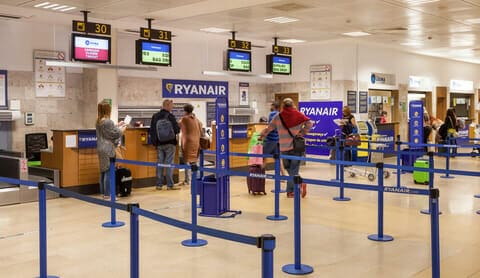
Airport English Conversation #1 – At the Check-In Desk
Dan is flying from New York to Los Angeles. When he arrives at the airport, he goes to the check-in desk. Listen to the conversation he has with the agent:
Agent: Good afternoon! Where are you flying to today?
Dan: Los Angeles.
Agent: May I have your passport, please?
Dan: Here you go.
Agent: Are you checking any bags?
Dan: Just this one.
Agent: OK, please place your bag on the scale.
Dan: I have a stopover in Chicago – do I need to pick up my luggage there?
Agent: No, it’ll go straight through to Los Angeles. Here are your boarding passes – your flight leaves from gate 15A and it’ll begin boarding at 3:20. Your seat number is 26E.
Dan: Thanks.
Download this lesson:
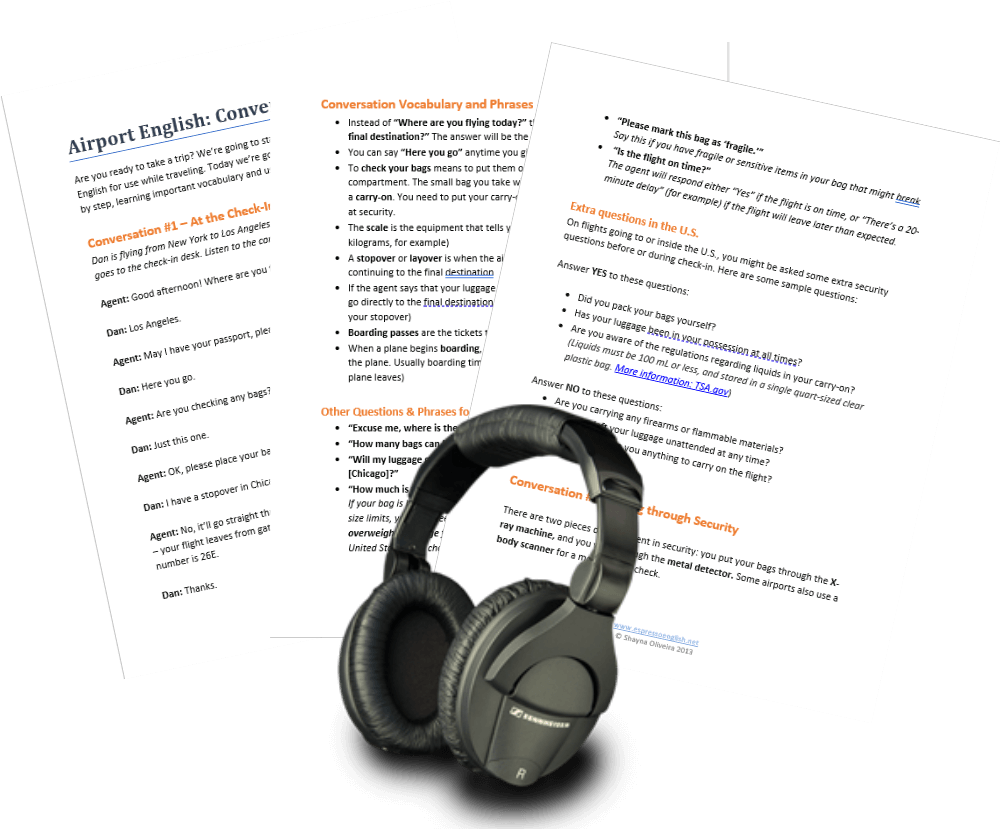
Yes! I want the PDF + Audio + Quiz
Conversation Vocabulary and Phrases
- Instead of “Where are you flying today?” the agent may ask “What’s your final destination?” The answer will be the same!
- You can say “Here you go” anytime you give something to somebody
- To check your bags means to put them on the airplane inside the cargo compartment. The small bag you take with you on the airplane is called a carry-on . You need to put your carry-on bags through the X-ray machine at security.
- The scale is the equipment that tells you the weight of your luggage (45 kilograms, for example)
- A stopover or layover is when the airplane stops in a different city before continuing to the final destination
- If the agent says that your luggage will go straight through , it means it will go directly to the final destination (and you don’t need to pick it up during your stopover)
- Boarding passes are the tickets that permit you to enter the airplane
- When a plane begins boarding , it means that the passengers start to enter the plane. Usually boarding time is 30-60 minutes before takeoff (when the plane leaves)
Other Questions & Phrases for the Airport
- “Excuse me, where is the American Airlines check-in desk?”
- “How many bags can I check?”
- “Will my luggage go straight through, or do I need to pick it up in [Chicago]?”
- “How much is the fee?” If your bag is heavier than the weight limits, or if your bag is larger than the size limits, you may need to pay extra: an oversized baggage fee or overweight baggage fee (this can be $75 to $300) . Some airlines in the United States also charge a fee for ALL checked bags (usually $15 to $30).
- “Please mark this bag as ‘fragile.’” Say this if you have fragile or sensitive items in your bag that might break
- “Is the flight on time?” The agent will respond either “Yes” if the flight is on time, or “There’s a 20-minute delay” (for example) if the flight will leave later than expected.
Extra questions in the U.S.
On flights going to or inside the U.S., you might be asked some extra security questions before or during check-in. Here are some sample questions:
Answer YES to these questions:
- Did you pack your bags yourself?
- Has your luggage been in your possession at all times?
- Are you aware of the regulations regarding liquids in your carry-on? (Liquids must be 100 mL or less, and stored in a single quart-sized clear plastic bag) More information: TSA.gov
Answer NO to these questions:
- Are you carrying any firearms or flammable materials?
- Have you left your luggage unattended at any time?
- Has anyone given you anything to carry on the flight?
Airport English Conversation #2 – Going through Security
There are two pieces of equipment in security: you put your bags through the X-ray machine, and you walk through the metal detector. Some airports also use a body scanner for a more careful check.
The X-ray machine has a conveyor belt that moves your bags automatically through the machine. You can put small items like keys or money into plastic bins.
In the picture below, the woman is walking through the metal detector. Her suitcase is on the conveyor belt after going through the X-ray machine.
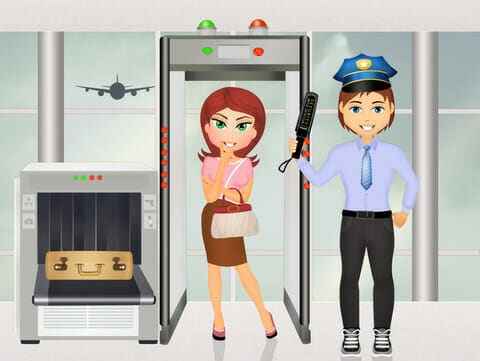
Agent: Please lay your bags flat on the conveyor belt, and use the bins for small objects.
Dan: Do I need to take my laptop out of the bag?
Agent: Yes, you do. Take off your hat and your shoes, too.
(he walks through the metal detector)
[BEEP BEEP BEEP BEEP]
Agent: Please step back. Do you have anything in your pockets – keys, cell phone, loose change?
Dan: I don’t think so. Let me try taking off my belt.
Agent: Okay, come on through.
(he goes through the metal detector again)
Agent: You’re all set! Have a nice flight.
The phrase “you’re all set” is a common expression that means “you’re finished and everything is OK.”
Phrasal Verbs: SET OFF and GO OFF
When the alarm sounds, we say “the alarm went off.” To describe what caused the alarm to sound, we say “set off” – for example, “My keys set off the alarm” or “My keys set off the metal detector.”
Airport English: Announcements at the Gate
Airports are divided into terminals (the major sections of the airport) and each terminal has many gates. The gate is the door you go through to enter the airplane. Here are a few announcements you might hear while you are at the gate, waiting for the plane to board.

- “There has been a gate change.” (this means the flight will leave from a different gate)
- “United Airlines flight 880 to Miami is now boarding.” (this means it’s time for passengers to enter the plane)
- “Please have your boarding pass and identification ready for boarding.”
- “We would like to invite our first- and business-class passengers to board.”
- “We are now inviting passengers with small children and any passengers requiring special assistance to begin boarding.”
- “We would now like to invite all passengers to board.” (this means everyone can enter the plane)
- “This is the final boarding call for United Airlines flight 880 to Miami.” (this means it is the FINAL OPPORTUNITY to enter the plane before they close the doors)
- “Passenger John Smith, please proceed to the United Airlines desk at gate 12.”

500+ Real English Phrases
Airport English Conversation #3: On the plane
The people who work inside the airplane serving food and drinks are called flight attendants. Both men and women who have this job are called flight attendants. Listen to this conversation that Dan has with the flight attendant when dinner is served on the flight.

Dan: Sorry?
Flight attendant: Would you like chicken or pasta?
Dan: I’ll have the chicken.
Flight attendant: Anything to drink?
Dan: What kind of soda do you have?
Flight attendant: Coke, Diet Coke, Sprite, Orange, and Dr. Pepper.
Dan: A Diet Coke, no ice, please.
Flight attendant: Here you go.
English Conversation Tips:
If you didn’t understand what the flight attendant said, you can say Sorry? or Pardon? to ask him or her to repeat it.
If you want to ask for something, you can use the phrase “Can I have…?” or “Could I have…?” Practice your pronunciation with these common requests:
- “Can I have a pillow?”
- “Can I have a blanket?”
- “Can I have a pair of headphones/earbuds?”
- “Could I have some water/coffee/tea?”
- “Could I have some extra napkins?”

Finally, if you need to stand up, but there is a person sitting between you and the aisle, you can say Excuse me and make a motion to start standing up. The person sitting next to you will understand and stand up to let you get out of your seat.
You’ve finished Lesson 16! I hope you’ve enjoyed these English conversations at the airport. Now take the quiz to test how well you remember the airport English phrases.
In tomorrow’s lesson, you’ll learn from more English conversations at the airport – phrases for arriving at the destination airport, going through immigration, and dealing with common travel problems.
Quiz: Travel English at the Airport
Congratulations - you have completed Quiz: Travel English at the Airport .
You scored %%SCORE%% out of %%TOTAL%%.
Your performance has been rated as %%RATING%%
This is a free sample lesson from the Everyday English Speaking Course Level 1
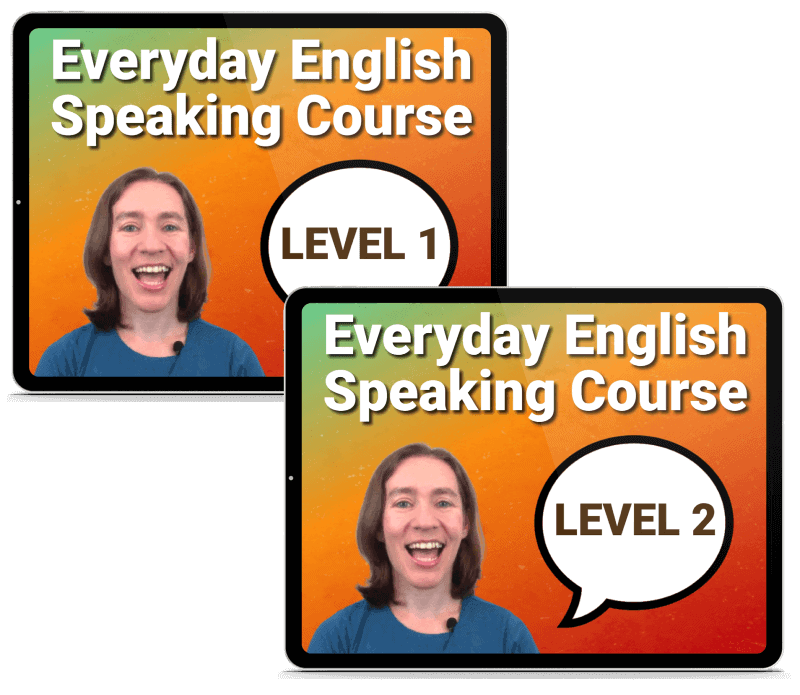
More Espresso English Lessons:
About the author.
Shayna Oliveira
Shayna Oliveira is the founder of Espresso English, where you can improve your English fast - even if you don’t have much time to study. Millions of students are learning English from her clear, friendly, and practical lessons! Shayna is a CELTA-certified teacher with 10+ years of experience helping English learners become more fluent in her English courses.
You are using an outdated browser. Please upgrade your browser or activate Google Chrome Frame to improve your experience.
Travel English Phrases
English is essential for communication in most countries.
Wherever you are going, you need to have a good grasp of the basics of the language to get around and communicate at the airport, hotel and everywhere in between.
This post has dozens of travel English phrases to help you navigate any foreign country. Learn what they mean and how you can use them!
At the Airport
On the airplane, arriving at your destination, riding public transportation, at the hotel, at a restaurant, sightseeing, emergencies, and one more thing....
Download: This blog post is available as a convenient and portable PDF that you can take anywhere. Click here to get a copy. (Download)
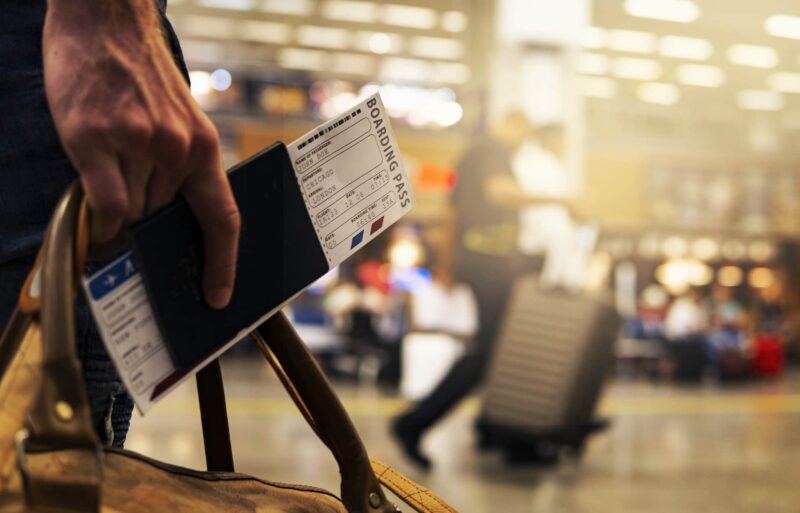
Excuse me, how do I… ?
If you are flying for the first time, you will need information on how to:
- Check in. When you check in , you are letting the airline know you have arrived. If the person you are talking to tells you to go to the check-in counter, you can follow up this question with “how do I get to the check-in counter?” to get directions. At the check-in counter, you present your ticket , a document that allows you to get your boarding pass. The boarding pass, in turn, will allow you to board (ride) your airplane.
- Board the airplane. If you are not sure about what you should do before you get on a plane and during your flight, you can ask the airline staff about this.
Where is the… ?
You will likely ask for general directions to one or more of the following:
- Information desk. As you can guess from the name, the information desk is where you can learn everything you need to know about getting around the airport. You can even ask for a map (a picture guide of the area) from them.
- Gate. A gate is where you will enter to get to the airplane. It is also the place where you wait before boarding your flight. The gate is usually written on your boarding pass.
- Restroom. A restroom is a place where you take care of personal business like combing your hair, washing your face or using the toilet. Depending on the country you are visiting, this room may also be called a bathroom , washroom, comfort room, loo or toilet .
- Charging station. If your phone has low or no battery, these places can get your device’s battery up to 100 percent again.
- Restaurant. If you feel hungry while waiting for your flight, you can visit a restaurant where you can eat in the meantime.
How do I get to… ?
Although they both seem to ask for directions, there is a slight difference between “where is the… ?” and “how do I get to… ?”
“Where is the… ?” will get you a general answer like “(The place you want to go to) is at Building A.”
Meanwhile, “how do I get to… ?” asks for specific directions, so the person you are talking to will reply with “From here, you turn left, and when you see this sign, turn right…” and so on.
What time is my flight?
Often, it may not be clear what time your specific flight is—in which case, this question will be useful.
What items am I allowed to bring on board?
Airlines usually have rules on what you can and cannot take into the airplane.
How much luggage am I allowed to carry on?
Your luggage includes all the bags you are bringing with you for the flight. Airlines often have limits on how much and how heavy your luggage should be.
Are meals included?
A meal is a collection of food served at one time. Not all airlines provide meals, so it may be good to ask if you will get these before you board.
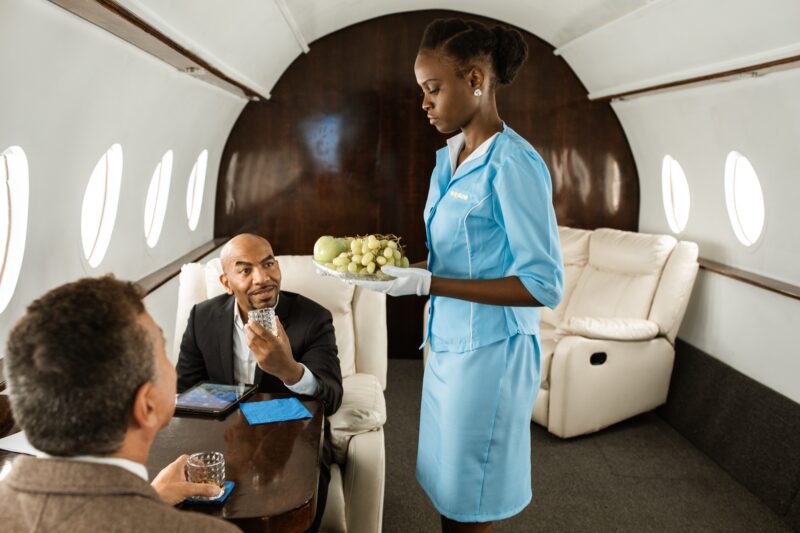
Excuse me, can you please help me put my luggage away?
Airplanes have baggage compartments or closed spaces above each of the seats. You can ask the flight attendant, an airplane employee in uniform who is usually female, to help you put your luggage in its compartment.
Can I please change my seat?
Once you get on the plane, you may want to change your seat because other seats are more comfortable, have a better view, etc.
How much does… cost?
You can ask about the cost of anything you want to buy like the following:
- water bottle
- snack (a small meal)
I would like… , please.
This phrase is the standard and polite way to ask for something that is usually free or something you do not have to pay for. For example, if you are thirsty, you might say “I would like a glass of water, please.”
Does my seat have… ?
For example, if you want a device to return your phone’s battery charge at or above acceptable levels, you can say “does my seat have a charging port ?” And if you want to move the seat back so you can lie down, say “does my seat have a recline button ?”
Excuse me, I need to…
There are a few things you can ask permission for on a plane. You can say “Excuse me, I need to…”
- Get out of my seat
- Use the restroom
- Move my luggage
What time is it?
This is a standard question for figuring out what time of the day it is. It is useful when you are flying over different time zones and when the plane finally lands.
For more vocabulary and phrases related to air travel, take a look at this post—it’s aimed at flight attendants, but you’ll learn a thing or two as well!
Knowing English for flight attendants is essential in today’s interconnected world. These 60+ English words and phrases will prepare you for the job before, during and…
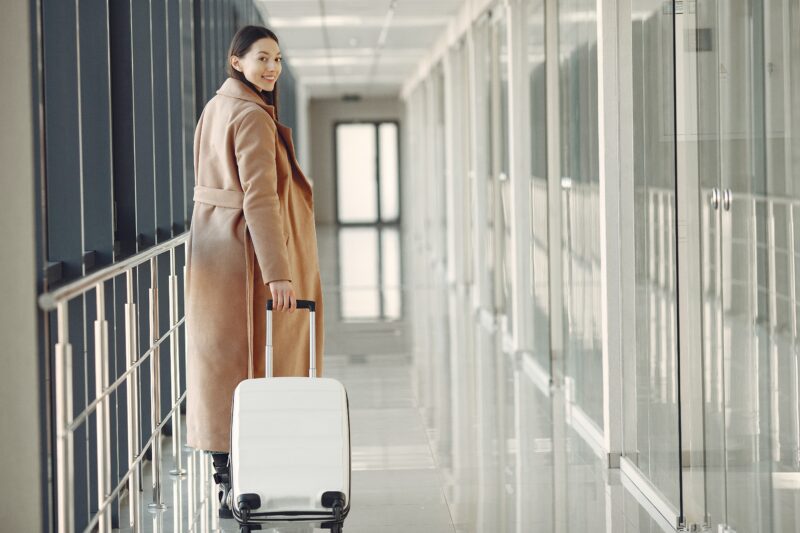
Once you are at your destination (the place you are visiting), some of the useful phrases you can use are the following.
Just like at the airport when you first arrived, “Where is the… ?” and “How do I get to… ?” are useful phrases when you are at your destination.
Some of the places where you might need directions are:
- Baggage claim area. Remember when you checked in your luggage? This is the place where you claim or get it.
- Currency exchange. A currency exchange is a place where you take the money you use in your own country and get it changed to the money used at your destination.
- Bus stop. Finding a bus stop will be especially helpful if you want to find a cheap way to get around. Asking “where is this bus going?” can also help you know if you are riding the right bus.
- Taxi / Taxi stand. No bus? Take a taxi instead, which is also called a cab in some places. You can usually find a group of taxis at taxi stands.
- Hotel. Of course, you should provide the name of your specific hotel.
- Immigration or customs. Immigration or customs is the place where you have to explain why you came to a country and tell officers what your intentions are.
Sorry, I do not understand what you are saying.
This phrase will help native English speakers know English is not your first language. You can also say “I do not speak English very well” and ask them to “please speak slowly” if you are still having trouble.
I recommend that you prep before you go by studying authentic English media like movies and TV shows. These can help you prepare for real interactions in English.
FluentU takes authentic videos—like music videos, movie trailers, news and inspiring talks—and turns them into personalized language learning lessons.
You can try FluentU for free for 2 weeks. Check out the website or download the iOS app or Android app.
P.S. Click here to take advantage of our current sale! (Expires at the end of this month.)

Try FluentU for FREE!
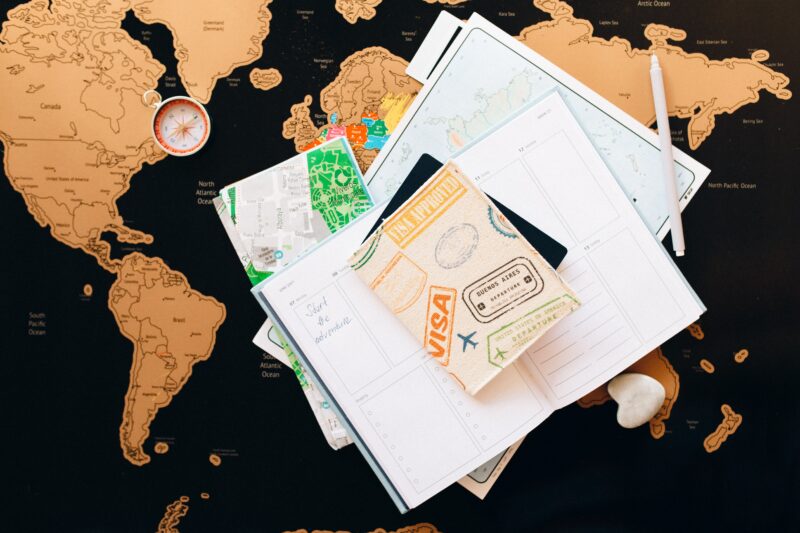
I have items to declare.
Aside from explaining why you are in a certain country, you also have to declare (make a formal or official statement on) the items that you may need to pay duties (taxes on items from another country) for.
If you do not have such items, you can simply say “I have nothing to declare.”
I have a connecting flight.
This is how you say you will board another plane to go somewhere else.
I am traveling for…
Depending on why you came to the country, you can say you are traveling for:
- Leisure. Say this if you are traveling because you are on vacation.
- Work. Say this if you are traveling because your company asked you to .
- Family. If you are traveling because you are visiting relatives, let the customs officer know.
I will be here for… days.
You will need to provide the number of days you will be staying in the country, like “I will be here for 90 days.”
If you have it, you can also show your visa , a document that proves you are allowed to enter the country for a certain purpose within a certain period.
I am staying at…
The customs officer may ask you where you will be sleeping. You can say “I am staying at (the name of your hotel)” or “I am staying at (the address of your family or friend in the country).”
Check out more airport vocabulary here .
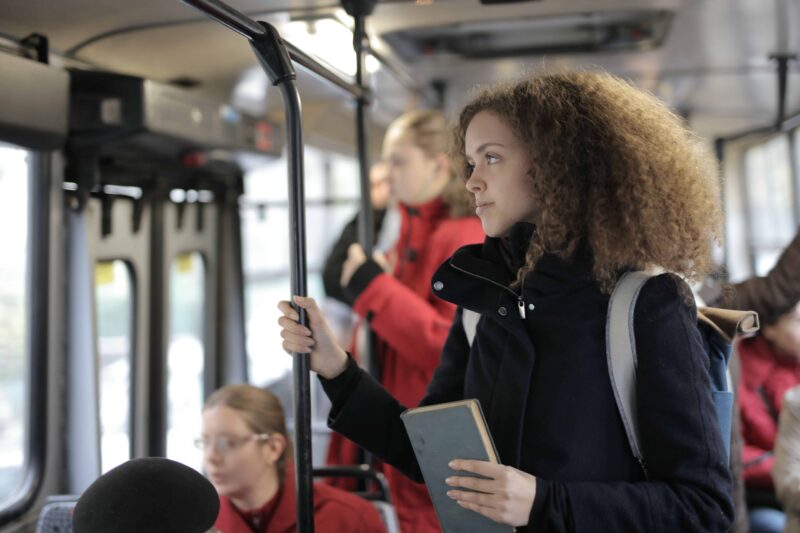
Now that you have arrived, you need to know how to get around. Here are some useful phrases you can use whether you are riding a bus, train or any other form of public transportation.
Does this go to… ?
Before you get on a bus or train, ask whether it is going to the place you want to go. If the driver says no, you can ask “how do I get to… ?” and take note of the directions they give you.
How long does it take to get to… ?
Here, you are asking how many minutes, hours, etc. it will take for the vehicle to get to your destination.
How much is the fare?
The fare is the price of riding your public transport.
“Do you accept… ?”
End this question with a mode of payment , which includes cash and cards .
Excuse me, is this seat taken?
This phrase is useful if you see someone with an empty seat beside or near them, but you want to be 100% sure they do not have a companion.
I missed my stop. Can you please let me know when we are at the next one?
In an ideal world, traveling would go smoothly. But sometimes, things like not being able to get off at your stop happen! Luckily, you can use this phrase to get you out of a pickle (get you out of trouble).
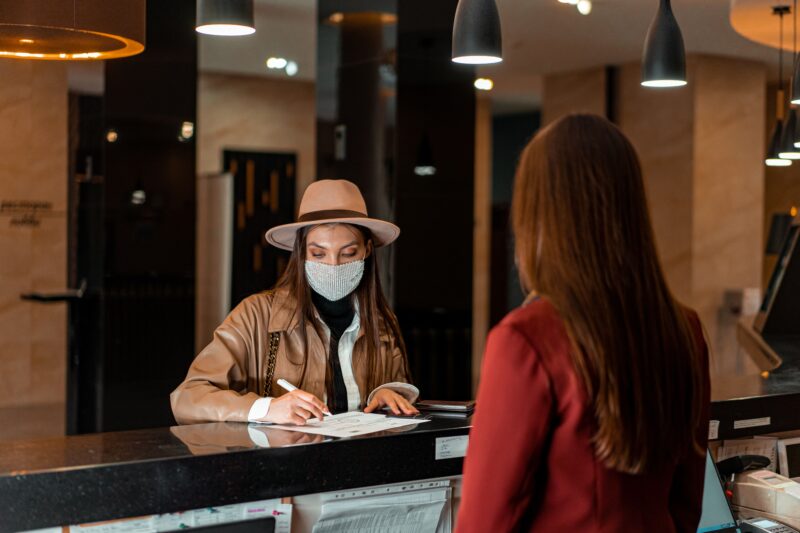
Of course, if you are staying with friends and family, you can skip this section. But if you will stay at a hotel, keep the following phrases in mind.
Greetings! I have a reservation under the name of…
End the phrase with your full name or the name you used to make your reservation.
When you get to your hotel, go to the front desk. It is easy to find because that is usually where you will first meet the hotel’s employees. Also, that is where the other guests will probably be!
You want to confirm that you have a reservation first—that is, proof that you have a room at the hotel where you are staying. Otherwise, you have to look for somewhere else to stay.
What is included in my reservation?
This question asks what services you have already paid for. Of course, there is your room, but you may also want to check for other things like breakfast, pool, spa, etc.
What time is check-in / check-out?
Since you will not be staying at the hotel all the time, you will want to know what time you can check in and check out.
Check in means the time you will be allowed to enter your room, while check out means the time you should leave your room.
Does the room have a… ?
You may also want to know about your room’s amenities (things to help make your stay more convenient and comfortable). For example:
- Bathroom / restroom. Again, the correct term for this place depends on where you are.
- Refrigerator / fridge. A refrigerator or “fridge” is a place to keep your food and drinks cold. Keep in mind that you may have to pay extra for any food or drinks you take out of hotel refrigerators.
- Wi-Fi. Wi-Fi is simply a wireless internet connection. You should probably also ask for the Wi-Fi password. ( “What is the Wi-Fi password?” )
- Air conditioner. An air conditioner is a piece of equipment that cools a room.
How many beds are in the room?
This question will help you know if there is enough space to sleep for the number of people in your hotel room.
What floor am I on?
A floor in this situation refers to the level of the hotel.
If you are on a high floor (like the 30th, for example), you may want to use the elevator , the device that lifts and lowers you between floors of the hotel, to help you get to your room.
My room needs…
Most of the time, housekeeping (the people who clean the room) will make sure you have everything you need. Should they forget, you can say “My room needs…” and finish with:
- Towels. Towels are soft, thick materials you use to dry yourself after taking a bath.
- Toilet paper. Toilet paper are thin white sheets rolled up on tubes. They help you wipe yourself in the bathroom.
- Bedsheets. “Bedsheets” is a term that includes pillowcases, blankets and all the other pieces of cloth that cover your bed.
Could I please have room service ?
As a guest, you can request services by saying “Could I please have… ?” For example, you can request room service , where someone will come up to your room to deliver food, drinks and other things you may need.
Where is the best… around here and how do I get there?
Since the hotel employees are locals, they will probably know the area more than you do.
Before you check out of your hotel, you can use this phrase and replace “…” with:
- Grocery store. Grocery stores are places where you can buy most types of items.
- Hospital. If you or someone you are traveling with gets sick or injured, you need to know where to go.
- Bank. If you run out of money, you may need to go by a bank to get more.
- Restaurant. Make sure you ask for a restaurant that offers local cuisine or food.

A table for two, please.
The number indicates how many people will be eating with you at the restaurant. It does not have to be just two: it can be any number of people with and including you.
I would like to drink…
Finish this phrase with the name of the drink you want. Popular drinks are:
- soda pop (carbonated sweet drinks)
May I see a menu?
A menu will help you decide what you want to eat.
I would like to order, please.
Once you have decided what to eat and drink, raise your hand and wait for a waiter to come to your table. Then, say this phrase to indicate that you are ready to order or ask questions about the food.
Could you recommend any popular dishes?
This is a good question to ask if you are not sure what to order.
May I ask if you have dishes that are… ?
You may prefer certain foods to others for personal reasons. For example, you can finish the question with any of the following:
- Vegetarian / Vegan When you say that dishes are vegetarian , that means they are mostly made of plant-based ingredients. When you say they are vegan , it means they do not have any animal ingredients (even eggs or milk!) at all.
- Halal. If you are a Muslim, you want to make sure that what you eat does not go against the laws of your religion. You may need to explain what ingredients make a food halal or haram , though.
Can you tell me about any potential allergens in this dish?
Allergens are ingredients in your food that can cause you to have a negative reaction. It may be a good idea to ask about these before you order a dish. The last thing you want is to not enjoy your meal because you got sick!
Can I please have… ?
Fill in the blank with an item off of the menu or one of these items:
- Appetizer. An appetizer is a small dish you eat before the main course (meal).
- Soup. Soup is a common way to start meals.
- Salad. If it is too warm for soup, try a salad!
- Dessert. A dessert is a sweet dish you eat after the main course.
- A glass of water. If you are not interested in any particular drinks, a glass of water is always a good option.
- Extra sauce / salt / spice. If you think your dish could use a little more sauce, salt or spice, you can ask if you can have more.
Can I ask for a refill?
The word refill comes from the prefix re- (which usually means “to repeat”) and fill . If your glass of water is empty and you want more, you can ask for a refill so your empty glass will have water again.
May I have the bill?
The bill indicates how much you have to pay after you eat the meal. Make sure to ask for this. In some restaurants, the waiters will not bring it to your table unless you ask.
If you want more useful English phrases to use in restaurants, check out this post on ordering food in English .

Of course, your trip would not be complete without souvenirs or items you buy to remember the place you visited! To make the most of your visits to shops, here are a few phrases to keep on hand.
Excuse me, where can I find… ?
Finish the question with what you are looking for.
Excuse me, how much is this?
This is a standard phrase for asking the price or cost of items.
Do you offer discounts?
When you ask for discounts , you are asking if the item comes at a lower price. Usually, the discount is shown in percentages (%). For example, if an item is $10 and there is a 50% discount on it, the final price would be $5.
Do you have a sale?
Another way to save money is to watch out for sales or events when you can buy items for much lower than their original cost.
Does this come in a bigger / smaller size?
If you are buying clothes, you may not be able to find something that fits you. In that case, use this phrase to check if they have your size. You can also ask “can I try this on?” to make sure the piece of clothing really fits!
What is your return and exchange policy?
Sometimes, you end up buying an item that you do not like or has defects (something wrong with it). A return and exchange policy allows you to either return (give back) the item to the store or exchange (switch or change) it with a similar one.
What forms of payment do you accept?
Here, you are asking if they accept cash, cards or any other form of payment you have on hand.
Can you recommend something similar to this?
If you find something you like but not quite or you want more varieties (colors, sizes, etc.) of the same item, this is a good question to ask.
For more shopping vocabulary you should know, go here .

Aside from the stores, you also want to check the sights and sounds of your destination! For those, here are the phrases you can use.
Where is the visitor information center?
The visitor information center is where you can get everything you need to know about an area—maps, landmarks, restaurants, shops, etc.
Excuse me, can you tell me what attractions I should check out around here?
There may be so many attractions in the area, you will not know where to start. This question can help you make your itinerary or travel plans for the day.
Are there any guided tours for this area?
Then again, you may not need to explore the area on your own. With a tour guide , you can plan where you want to go, get information on each attraction and even some interesting tidbits (facts) about them!
Are there any rules and restrictions I should know?
As a visitor, the last thing you want is to get into trouble. You want to know what you should do (the rules) and what you should not do (the restrictions).
Can you take a photo of me in front of… ?
A trip is not complete without pictures you can post on social media! There are times when you may want to take pictures of yourself in front of a site and that is where this phrase comes in.
Are there any events or festivals around here?
If you want to enjoy the place the way the locals do, this is a question you should ask.
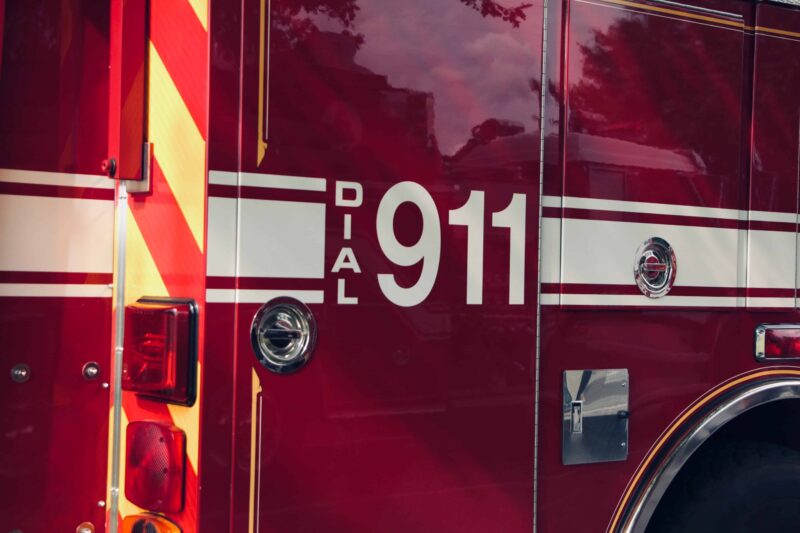
Even with careful planning, you may encounter some problems with your travels. Here are some phrases to help you out if something bad happens.
I have lost my…
End this phrase with any valuables (important items) you lose, such as:
- Passport. If you lost your passport, you need to find an embassy or state organization that represents your home country in the place you are visiting. To ask for directions to the embassy, say “where is the embassy for… ?” and end the question with your country’s name in English.
- Wallet. If someone stole your wallet or something else from you, you need to contact the local police , the organization responsible for dealing with crimes. In the United States, for example, you can call 911 on a phone.
- Way. When you say you have lost your way , you mean you are not sure where you are and where you should go. If you have a destination in mind, you can say “how do I get to… ?” and end the question with where you want to go.
If something bad is happening to you, calling out this word will get people’s attention and—hopefully—get you the help you need.
I feel…
Sometimes, the people who come to help you may need more information about what you need help with. For example, you could say “I feel…”
- Dizzy / Faint. Dizzy or faint means your head feels light, as though it is being turned around and around.
- Sick. If you do not feel well in any way, you should say “I feel sick.”
If your body hurts, you can also say “I am in pain.”
With these travel English phrases, you should be able to get around most countries without much trouble.
Enjoy your trip!
If you like learning English through movies and online media, you should also check out FluentU. FluentU lets you learn English from popular talk shows, catchy music videos and funny commercials , as you can see here:

If you want to watch it, the FluentU app has probably got it.
The FluentU app and website makes it really easy to watch English videos. There are captions that are interactive. That means you can tap on any word to see an image, definition, and useful examples.

FluentU lets you learn engaging content with world famous celebrities.
For example, when you tap on the word "searching," you see this:

FluentU lets you tap to look up any word.
Learn all the vocabulary in any video with quizzes. Swipe left or right to see more examples for the word you’re learning.

FluentU helps you learn fast with useful questions and multiple examples. Learn more.
The best part? FluentU remembers the vocabulary that you’re learning. It gives you extra practice with difficult words—and reminds you when it’s time to review what you’ve learned. You have a truly personalized experience.
Start using the FluentU website on your computer or tablet or, better yet, download the FluentU app from the iTunes or Google Play store. Click here to take advantage of our current sale! (Expires at the end of this month.)

Enter your e-mail address to get your free PDF!
We hate SPAM and promise to keep your email address safe

Conversation Worksheets about Travel
The ESL Worksheets and teacher's notes on this page are in PDF format. You are free to download, print and photocopy them unmodified for classroom use.


TRAVEL ENGLISH/ENGLISH FOR TOURISTS
Learn/practice common english phrases used by travelers.


- English Conversation Lessons
- English Essay Topics
- English Autobiography Examples
- Report Writing
- Letter Writing
- Expansion of Ideas(English Proverbs)
- English Grammar
- English Debate Topics
- English Stories
- English Speech Topics
- English Poems
- Riddles with Answers
- English Idioms
- Simple English Conversations
- Greetings & Wishes
- Thank you Messages
- Premium Plans
- Student’s Log In
Travel Conversation Dialogues in English
Traveling exposes one to new sights, emotions, and experiences. Outings teach you a lot of things and modify your view on life. If you are fluent in English, you can go anywhere in the world and make many new acquaintances. Learn travel conversation dialogues as well as travel terminology to spice up your language ability and enjoy travelling to any region of the world.
If you find yourself stuck in the middle of nowhere, you will undoubtedly receive prompt assistance. Because your ability to communicate will aid you in locating and arriving at your desired location. So plan your route ahead of time and travel with confidence by learning travel conversation dialogues in English. Do not be scared of the obstacles; instead, continue to study and improve your English communication abilities , as they will come in handy in your life to manage any challenging scenario.
Travel Conversation Lessons Topics
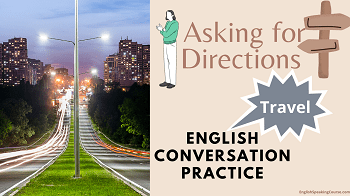
- Asking for Directions
It is extremely normal to get lost when travelling and then hunt for the right place. Wonderful travel talk between a tourist and a few bystanders guiding how to go to a place. Traveling is enjoyable, but it can be quite irritating when you are travelling overseas and are unable to obtain accurate directions.
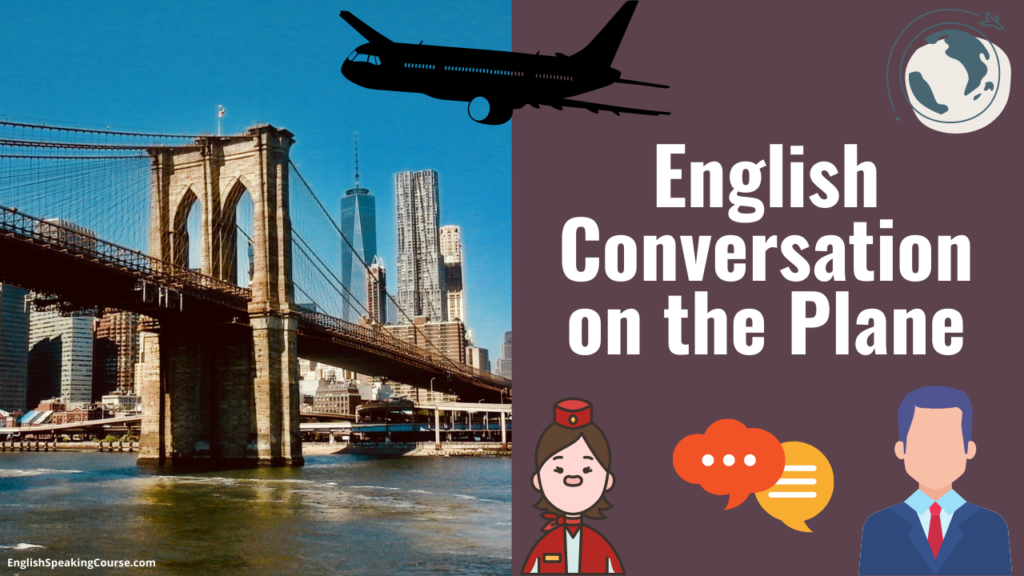
- Conversation on the Plane
Travelling and socializing are inextricably linked. Even while we’re on board, we talk to a lot of strangers, such as the flight crew or the flight attendant. However, it is critical to communicate with such folks nicely and respectfully. In conclusion, you will learn new dialogues concentrating on travel conversations to help you improve your language abilities.
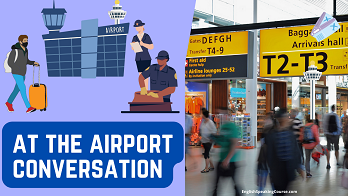
Conversation at the Airport
When checking in at the airport, this is a very frequent travel dialogue. Moreover, it is when you follow the method specified by the officials there. Get through the full procedure and communicate with the employees without becoming frustrated. Most importantly, don’t pass up any opportunity to converse in English and take it to the next level.
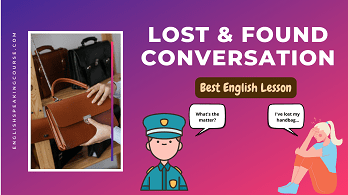
- Lost and Found Conversation
A simple yet odd conversation that everyone will, at some point in their lives, indulge in at least once. It is a conversation about lost and found items between a woman who has misplaced her handbag and a security guard whom she contacts in order to register her complaint.

Museum Vocabulary & Dialogues
This is a wonderful opportunity to improve one’s English language skills by studying museum vocabulary and dialogue. Using these vocabulary words and dialogues as a guide, you may improve your ability to communicate in English and practise having conversational exchanges. When you go to the museum the next time with your family or friends, make sure to take advantage of the opportunity to have some engaging dialogues.
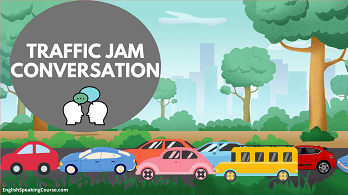
Conversation about Traffic Jam
In this Basic English speaking lesson, a father and a son are having a conversation about traffic jams. This problem is one that practically all of us face on a daily basis in our lives. Therefore, make the most of the opportunity to master the language associated with traffic and the accompanying conversations so that you may use it anytime you find yourself in a similar scenario.
Buy this Bundle Plan
Start Talking Perfect English Right Now!

Full English Speaking Course – All Lessons – Yearly Plan
Course Content for Students & Teachers:
100+ Video and Audio based English Speaking Course Conversations
12000+ Text & Audio based Frequently used Vocabulary & Dialogues with correct pronunciations
Full Grammar & 15000+ Solved Composition topics on Essay Writing, Autobiography, Report Writing, Debate Writing, Story Writing, Speech Writing, Letter Writing, Expansion of Ideas(Proverbs), Expansion of Idioms, Riddles with Answers, Poem Writing and many more topics
Plus Access to the Daily Added Content
Leave a Reply Cancel reply
You must be logged in to post a comment.

English Courses
- Mom & Son Breakfast Talk
- Dad & Son Breakfast Talk
- Going Out for Breakfast
- Healthy Breakfast Ideas
- Breakfast Table Conversation
- Talking about Household Chores
- Power Outage Conversation
- Speaking About Vegetables
- Talk About Television
- Telephone Conversation in English
- Renting an Apartment Vocabulary
- Talking about Pets
- Self Introduction Conversation
- Introduce Yourself in English
- Morning Walk Conversation
- Make New Friends Conversation
- English Speaking with Friends
- Conversation Between Siblings
- Talking about Smartphones
- Talking About City Life
- English Conversation on the Bus
- Talking about Dust Allergy
- Talking about Food Allergies
- Brushing Teeth Conversation
- Replacing Worn out Toothbrush
- Brushing Teeth with Braces
- Switching to Herbal Toothpaste
- Benefits of using Tongue Cleaner
- Talking about Illness
- Talking about Fitness and Health
- Talking About Fitness for Kids
- Visiting a Doctor Conversation
- Speaking about Lifestyle
- Conversation about Air Pollution
- Using an ATM Conversation
- Opening a Bank Account
- Car Accident Conversation
- Talking about Accident
- Exam Conversation with Kids
- At the Library Conversation
- Talking about Studies
- Offline vs Online School
- Internet Vocabulary and Dialogues
- Advantages of Homeschooling
- Inviting for Birthday Party
- Phone Conversation
- At the Airport Conversation
- Museum Vocabulary
- Conversation about Traffic
- Order Food Over the Phone
- At the Restaurant Conversation
- Talking about Music
- English Music Vocabulary
- Talk on Music Band
- Shopping for Clothes
- Buying a Smartphone
- Ordering Flowers Conversation
- English Conversation in Vegetable Market
- At the Supermarket
- At the Pharmacy
- Friends Talking about Chess
- Importance of Outdoor Activities
- Talking About Football
- Weekend Plans Conversation
- At the Beach Conversation
- New Job Conversation
- Business English Conversation
- Expressing Boredom in English
- English Conversation at the Salon
- English Speaking at the Bakery
- Talking About Studies
- Siblings Studying Together
- Speaking about Outdoor Activities
- Talk About Photography
- Essay on My School
- Essay on Summer Vacation
- Essay on Time Management
- Essay on Hard Work
- Essay on Health is Wealth
- Essay on Time is Money
- Republic Day Essay
- Essay on My Hobby
- Essay on Myself
- Essay on My Teacher
- Essay on My Best Friend
- Essay on My Family
- Essay on My Mother
- Essay on My Father
- Essay on Friendship
- Essay on Global Warming
- Essay on Child Labor
- Essay on Mahatma Gandhi
- Essay on Holi
- Essay on Pollution
- Essay on Education
- Essay on Air Pollution
- Essay on Communication
- Essay on Doctor
- Essay on Environment
- Essay on Gender Inequality
- Essay on Happiness
- Essay on Healthy Food
- Essay on My Favorite Festival Diwali
- Essay on My Favorite Sport
- Essay on My Parents
- Essay on Overpopulation
- Essay on Poverty
- Essay on Travelling
- Essay on Unemployment
- Essay on Unity in Diversity
- Essay on Water Pollution
- Essay on Water
- Essay on Women Empowerment
- Essay on Yoga
- Essay on Christmas
- Autobiography of a Book
- Autobiography of a Brook
- Autobiography of a Camera
- Autobiography of a Cat
- Autobiography of a Classroom
- Autobiography of a Coin
- Autobiography of a Dog
- Autobiography of a Doll
- Autobiography of a Farmer
- Autobiography of a Flower
- Autobiography of a Football
- Autobiography of a Haunted House
- Autobiography of a House
- Autobiography of a Kite
- Autobiography of a Library
- Autobiography of a Mobile Phone
- Autobiography of a Mosquito
- Autobiography of a Newspaper
- Autobiography of a Pen
- Autobiography of a Pencil
- Autobiography of a River
- Autobiography of a Table
- Autobiography of a Tiger
- Autobiography of a Tree
- Autobiography of an Umbrella
- Autobiography of Bicycle
- Autobiography of Bird
- Autobiography of Chair
- Autobiography of Clock
- Autobiography of Computer
- Autobiography of Earth
- Autobiography of Lion
- Autobiography of Peacock
- Autobiography of Rain
- Autobiography of a Soldier
- Autobiography of Sun
- Autobiography of Water Bottle
- Autobiography of Water Droplet
- Adopting a Village
- Teaching Children in an Adopted Village
- Programs Organized in an Adopted Village
- Volunteering in an Adopted Village
- Activities in an Adopted Village
- School Annual Day Celebration
- Republic Day Celebration
- Teachers Day Celebration
- World Environment Day Celebration
- Children’s Day Celebration
- Visiting the Wild Animal Rehabilitation Centre
- The Animal Sanctuary Visit
- Animal Shelter Visit
- Animal Rescue Center Visit
- Adult Literacy Camp
- Burglary of Jewelry
- India Wins Test Match
- School Children Affected by Food Poisoning
- Heavy Rains in Mumbai
- School Children Injured in Bus Accident
- Complaint Letter to the Chairman of Housing Society
- Request Letter to the Municipal Corporation
- Complaint Letter to the State Electricity Board
- Suggestion Letter to the Chief Minister
- Request Letter to the District Collector
- Request Letter to the Commissioner of Police
- Application Letter for an Internship
- Application Letter for a Job
- Request Letter for a Character Certificate
- Request Letter for a Better Lab and Library
- Global Warming Debate
- Animal Rights Debate
- Climate Change Debate
- Gun Control Debate
- Role of Religion in Society Debate
- Republic Day Speech
- Poems about Life
- Poems about Nature
- Poems for Boys
- Poems for Girls
- Poems for Mothers
- Poems for Friends
- Poems for Kids
- Poems about Trees
- Poems about Peace
- Funny Poems
- Poems About Climate Change
- Poems about Dreams
- Poems about Education
- Poems about Environment
- Poems about Eyes
- Poems about Family
- Poems about Fear
- Poems about Feminism
- Poems about Flowers
- Poems about Freedom
- Poems about Friendship
- Poems about Happiness
- Poems about History
- Poems about Hope
- Poems about India
- Poems about Joy
- Poems about Loneliness
- Poems about Love
- Poems about Night
- Poems about Power
- Poems about Water
- Poems about Women Empowerment
- Poems about Women’s Rights
- Poems on Earth
- Poems on Home
- Poems on Honesty
- Poems on Humanity
- Poems on Jungle
- Poems on Kindness
- Poems on Mental Health
- Poems on Moon
- Poems on Music
- Poems on Patriotism
- A Bad Workman Always Blames His Tools
- A Bird in the Hand is Worth Two in the Bush
- A Fool and His Money Are Soon Parted
- A Penny Saved is a Penny Earned
- A Picture is Worth a Thousand Words
- A Stitch in Time Saves Nine
- A Watched Pot Never Boils
- Absence Make the Heart Grow Fonder
- Actions Speak Louder than Words
- All Good Things Come to Those Who Wait
- All Good Things Must Come To an End
- All Is Fair in Love and War
- All That Glitters is Not Gold
- All’s Well That Ends Well
- An Apple a Day Keeps the Doctor Away
- An Empty Vessel Makes Much Noise
- An Idle Mind is Devil’s Workshop
- As You Sow, So Shall You Reap
- Barking Dogs Seldom Bite
- Beauty is in the Eye of the Beholder
- Beggars can’t be Choosers
- Better Late than Never
- Better the Devil You Know than the Devil You Don’t
- Birds of a Feather Flock Together
- Blood is Thicker than Water
- Boys will be Boys
- Charity Begins at Home
- Cleanliness is Next to Godliness
- Curiosity Killed the Cat
- Don’t Bite Off More than You Chew
- Don’t Bite the Hand that Feeds You
- Don’t Blow Your Own Trumpet
- Don’t Count your Chickens Before They Hatch
- Don’t Cry Over Spilled Milk
- Don’t Judge a Book by its Cover
- Don’t Put All Your Eggs in One Basket
- Don’t Put the Cart Before the Horse
- Don’t Throw The Baby Out With the Bathwater
- Early to Bed and Early to Rise Makes a Man Healthy, Wealthy, and Wise
- Easy Come, Easy Go
- Every Cloud Has a Silver Lining
- Every Dog Has His Day
- Fools Rush in Where Angels Fear to Tread
- Fortune Favors the Bold
- Give a Man a Fish, and You Feed Him for a Day; Teach a Man to Fish, and You Feed Him for a Lifetime
- Give Credit Where Credit is Due
- God Helps Those Who Help Themselves
- Half a Loaf is Better Than None
- Haste Makes Waste
- Health is Wealth
- Honesty is the Best Policy
- If at First You Don’t Succeed, Try, Try Again
- If It ain’t Broke, Don’t Fix It
- If the Shoe Fits, Wear It
- If you can’t Beat them, Join them
- If you Want Something Done Right, Do It Yourself
- Ignorance is Bliss
- It ain’t Over Till the Fat Lady Sings
- It Takes Two to Tango
- It’s a Small World
- It’s Always Darkest Before the Dawn
- It’s Better to Ask Forgiveness than Permission
- Its Better to Be Safe than Sorry
- It’s Better to Give than to Receive
- It’s Never Too Late to Mend
- It’s not What you Know, it’s Who you Know
- Jack of All Trades, Master of None
- Keep Your Friends Close and Your Enemies Closer
- Keep Your Mouth Shut and Your Eyes Open
- Kill Two Birds with One Stone
- Knowledge is Power
- Laughter is the Best Medicine
- Leave No Stone Unturned
- Let Sleeping Dogs Lie
- Life is a Journey, Not a Destination
- Life is Like a Box of Chocolates; You Never Know What You’re Gonna Get
- Like Father, Like Son
- Look Before You Leap
- Love Conquers All
- Make Hay While The Sun Shines
- Money Can’t Buy Happiness
- Money Doesn’t Grow on Trees
- Money Talks
- Necessity is the Mother of Invention
- No Man is an Island
- No Pain, No Gain
- Nothing Ventured, Nothing Gained
- One Man’s Trash is Another Man’s Treasure
- Out of Sight, Out of Mind
- Patience is a Virtue
- Practice Makes Perfect
- Prevention is Better than Cure
- Rome Wasn’t Built in A Day
- Slow and Steady Wins the Race
- The Early Bird Catches the Worm
- The Grass is Always Greener on the Other Side
- The Pen is Mightier Than the Sword
- The Proof of the Pudding is in the Eating
- There is No Place Like Home
- There’s No Time Like the Present
- Time Heals All Wounds
- Time is Money
- Too Many Cooks Spoil the Broth
- Two Heads are Better than One
- When in Rome, do as the Romans do
- Where There’s Smoke, There’s Fire
- You Can Lead a Horse to Water, But You Can’t Make it Drink
- You Can’t Have Your Cake and Eat It Too
- You Can’t Make an Omelet Without Breaking Eggs
- You Scratch My Back, And I’ll Scratch Yours
- You’re Never Too Old to Learn
- You’re Only As Strong As Your Weakest Link
- Parts of Speech
- Lola’s Dream
- Snowy Learns to Brave the Rain
- The Ant Explorer
- The Blind Archer
- The Brave Ant
- The Disguised King
- The Enchanted Blade
- The Enchanted Garden of Melodies
- The Endless Bag
- The Faithful Companion
- The Farmer’s Treasure
- The Frog and the Mischievous Fishes
- The Fruit Seller’s Fortune
- The Generous Monkey of the Forest
- The Gentle Giant
- A Blessing in Disguise
- A Dime a Dozen
- A Piece of Cake
- Apple of My Eye
- As Easy as Pie
- Back to the Drawing Board
- Beat Around the Bush
- Bite the Bullet
- Break a Leg
- Butterflies in My Stomach
- By the Skin of Your Teeth
- Caught Red-Handed
- Come Rain or Shine
- Cool as a Cucumber
- Cry over Spilled Milk
- Cut the Mustard
- Devil’s Advocate
- Down to the Wire
- Drink Like a Fish
- Eating Habits
- Supermarket
- Vegetable Market
- College Canteen
- Household Topics
- Diwali Festival
- Republic Day Wishes
- Birthday wishes for kids
- Birthday Wishes for Sister
- Birthday Wishes for Brother
- Birthday Wishes for Friend
- Birthday Wishes for Daughter
- Birthday Wishes for Son
- Women’s Day Wishes
- Thanks for Birthday Wishes
- Thank You Messages for Friends
- Thanks for Anniversary Wishes

Justin Morgan
Latest articles.
- Practical English Usage
- Overview of Babson University
- Babson University’s Entrepreneurship Program
- The Founding of Babson University
- Babson University’s Impact on the Global Economy
- Babson University’s Post-Pandemic Student Preparation
- Babson University’s Notable Alumni
- Babson University’s Business Research
- Campus Life at Babson University
- Babson University’s Leading Scholars and Experts
- Babson University’s Social Impact Program
- The Future of Babson University
- Top Programs at Cardiff University
- COVID-19 Research at Cardiff University
- Culture and Values of Cardiff University
English Discussion on Travel
esl discussions.com.
HOME: More Discussions
PDF | Word | Help my site
THE DISCUSSION ON TRAVEL
STUDENT A's QUESTIONS (Do not show these to Student B.)
STUDENT B's QUESTIONS (Do not show these to Student A.)

Copyright © 2008-2023 by Sean Banville | Privacy Policy | Links
Learn English for travel with our lessons on travel English. Learn English phrases and vocabulary for checking into a hotel, making travel arrangements and dealing with customs and immigration at the airport.
Business English Travel Lessons
Learn travel English with Business English Pod lessons on English for travel .
Business English Pod offers English for travel lessons that cover various travel English topics, such as airport check-in, hotel reservations, ordering food, and making small talk with locals. These lessons provide practical vocabulary and phrases for different situations, helping learners communicate effectively while traveling.
Our travel English lessons are listed by published date with the newest lessons first.
BEP 295 – Business Trip 4: Factory Inspection
Bep 294 – business trip 3: confidential discussion, bep 284 – business trip 2: giving directions and getting around, bep 283 – business trip 1: taking a taxi, bep 26c – travel english: dealing with problems.
- BEP 25c – Travel English: Checking in for a Flight
- BEP 248 – Socializing with Strangers (2)
- BEP 247 – Socializing with Strangers (1)
- BEP 188 – Socializing: Hosting a Dinner Party 2
- BEP 187 – Socializing: Hosting a Dinner Party 1
- BEP 186 – Air Travel: Connecting Flights
- BEP 185 – Air Travel: Checking In to a Flight
- BEP 135 – Travel English: Airport Security
- BEP 134 – Travel English: Getting Online at the Coffee Shop
- BEP 125 – Travel English: Renting a Car
- BEP 124 – Travel English: Checking Out of a Hotel
- BEP 96 – Socializing: Business Meals
- BEP 89 – Telephoning: Making Arrangements
- BEP 88 – Telephoning: Booking a Travel Ticket
- BEP 80 – Travel English: Checking In to a Hotel
- BEP 79 – Travel: Making a Hotel Reservation
- BEP 67 – Socializing with Colleagues at Work
- BEP 66 – Working with Colleagues and Making Requests
- BEP 56 – Business Travel 2: Customs and Immigration
- BEP 55 – Business Travel: Airport Departure and Take Off
- BEP 26 – Travel: Connecting Flights and Travel Problems
- BEP 25 – Travel: Airport Check In and Making Polite Requests

Welcome back to Business English Pod for today’s lesson on conducting a factory inspection in English.
In the global economy, a company might have its headquarters in Germany, but outsource production to China and technical support to India. Or you might find a Korean company that contracts out to one factory in Malaysia and another in Vietnam. In any case, to make the right decision on production facilities, you’ll most likely need to conduct a factory inspection.
So if you’re flying halfway around the world to tour a factory or another facility, what kind of questions should you ask? And how can you make sure the factory is the right fit for your needs? Well, you’ll definitely want to ask questions about quality control to make sure the factory can meet your expectations. You might also ask about production capacity so you know they can handle the work properly. And you might ask about their approach to standards, to make sure they’re in line with your values.
Of course, talk is cheap. You might find a factory manager makes claims that are a bit unbelievable. In these situations, you’ll want to show skepticism, or doubt, and ask for evidence. This is all part of the due diligence necessary to make sure you’re making the right choice.
In today’s dialog, we’ll hear Cam and Vanessa, who work for an American clothing company. They want to find a new production facility, so they’re touring a factory in China. You’ll also hear Chen, a factory manager who’s giving Cam and Vanessa a tour of the facility. Cam and Vanessa want to find out if Chen’s factory is a good fit for their company.
Listening Questions
1. How does Vanessa react to Chen’s claim that they have a .25% defect rate? 2. What important issue does Cam say their company is very serious about? 3. What kind of proof does Vanessa want to see of the factory managers’ training?

Welcome back to Business English Pod for today’s lesson on having a confidential discussion during a business trip.
If you’ve got colleagues or clients in other parts of the world, you probably rely a lot on email and the phone. But meeting in person continues to be important for building relationships and trust, and for discussing important issues. That’s one reason, of course, why the overseas business trip remains important.
And there’s one type of discussion that can be especially difficult: discussing a confidential matter. Perhaps you need to deliver bad news, or share sensitive information or tell someone about an important change. Meeting face-to-face in these types of situations is often the best way to break the news.
So what’s the best way to go about this? Well, to begin, it’s important to set a positive tone to put the other person at ease. Next, you might want to ask him or her how things are going. That can help break the ice, and the other person might actually mention the topic you want to discuss. Once you’ve started this way, you can introduce the sensitive information you want to deliver. And because the information is sensitive, you need to ask for discretion. Finally, depending on the nature of the discussion, you might also have to provide reassurances. After all, after we hear important information, we might wonder how it will impact us.
In today’s dialog, we’ll hear Cam, who works for an American clothing company. He’s visiting the head of the company’s Chinese office, David. The company manufactures some of its clothing in China, and has been considering how to expand their retail activities in Asia. Cam needs to have a confidential discussion with David to share some important news.
1. How does Cam ask for David’s perspective on the current situation? 2. Cam needs to tell David about a decision regarding retail in China. What point does Cam mention to introduce this decision? 3. How does Cam reassure David near the end of the conversation?

Welcome back to Business English Pod for today’s lesson on giving directions and getting around a city. This lesson is part of a larger series that looks at the Business English you need for a successful overseas business trip .
Getting from point A to point B in a city isn’t always simple. Even with a map, there are lots of opportunities for confusion. First of all, a map doesn’t include the names of every little shop or house. And even though a map might show you where some major things are, it won’t tell you how to get there. For these reasons, we still rely on people for advice on getting around. And whether you’re traveling and need to understand someone’s directions, or whether someone asks you for directions, you need the right language.
This is what we’ll look at in today’s lesson. We’ll learn language and techniques for describing a location, suggesting the best travel option, and describing distance. We’ll also look at how to give basic directions, how to explain a change of course, and how to ask a stranger for help on the street.
In the dialog, we’ll rejoin Cam and Vanessa, who have traveled to Shanghai on business. They’re talking to the concierge at their hotel, who is explaining to them how to get to a specific coffee shop in the city’s Pudong business district.
1. What does the concierge recommend as the best travel option? 2. How does the concierge describe the distance to Hengshan Lu Station? 3. When Cam approaches a stranger in the street, what is the first question he asks?

Welcome back to Business English Pod for today’s lesson on taking a taxi. This will be part of a larger series that looks at the Business English you need for a successful overseas business trip .
When you travel to another city for business, what’s the easiest way to get around? Usually by taxi. You don’t have to interpret a subway map or a bus schedule. And you can be delivered directly to your destination with little confusion, though it will cost you more of course.
Yes, I said “with little confusion,” though that’s not always the case. Taxi drivers might not always understand what you want, or what you’re saying. You’ve still got to communicate clearly, directly, and politely with the taxi driver. Your fate is in his – or her – hands, and so you need to make sure you’re understood.
This is exactly what we’ll learn today. We’ll cover some important types of requests during a taxi ride, including asking for a destination, requesting a specific route, and asking for a change of course. We’ll also learn how to ask to be let out and request a receipt.
In this lesson, we’ll hear Cam and Vanessa, who have just arrived in Shanghai on a business trip. They’ve passed through immigration and collected their bags, and now they want to take a taxi to their hotel.
1. What is the travelers’ destination, and where is it located? 2. Vanessa asks for a change of course to get to a bank. How does she describe how to get there? 3. How does Vanessa ask to be let out of the taxi?

Welcome back to Business English Pod for today’s lesson on how to deal with problems you might experience when traveling by air.
This Business English lesson is part of our new series of fresh takes on some of our older lessons. We’ve kept the same dialog but have new explanations and practice for our lower level learners.
When you are traveling for business, have you ever had problems that seem beyond your control? Like when you show up at the airport and your flight is cancelled. Or when your flight is late and you can’t get to your destination on time? These situations can be frustrating and difficult to deal with. But there are some language techniques that you can learn to help you solve your problems.
In this lesson, we’ll look at some of these techniques, such as getting someone’s attention, using negative questions for requests, and agreeing reluctantly. We’ll also cover making polite refusals, correcting yourself, and asking about payment. These are all things you might have to do or understand as you solve a travel problem.
In the dialog you’re going to hear a traveler called Robert. If you heard our last lesson, you might remember that Robert was traveling to Nice but stopping in Paris first. In this lesson, you’ll hear Robert in the Paris airport. He has missed his connecting flight to Nice and now he’s trying to find a way to get to his destination in time for a meeting the next day.
1. When is the next available flight to Nice? 2. Why is the next available flight not acceptable to Robert? 3. What does Robert want instead of the next available flight to Nice? 4. What type of seat does the agent say is the only type available?
Improve your English. Speak with confidence!
- Free Mini Course

- Posted in in ESL Conversation Questions
70 travel conversation questions to practice your English
- Posted by by Cameron Smith
- January 27, 2023
- Updated April 20, 2023
Use this list of travel conversation questions to help your students practice their English speaking skills.
Almost everyone has a strong opinion or two on travel. Whether they love to travel by plane, train, or automobile or prefer to avoid travel altogether, these fun travel questions should spark some lively conversations in your classroom!
Travel conversation questions
- Where is the most interesting place you have ever visited?
- What activities do you like to do when you travel?
- Do you prefer to travel alone or with others?
- Have you ever traveled abroad?
- In your opinion, what is the ideal length of a vacation or trip abroad?
- What has been your most memorable travel experience?
- What are the benefits of traveling?
- What is the best way to save money while traveling?
- What type of transportation do you use when traveling?
- How often do you go on holiday trips?
- Do you ever travel for business? Would you like to?
- Have you ever gone on a long distance trip?
- How has travelling changed your life?
- What is the most exotic place you have ever visited?
- What do you think are the essential items to bring when traveling?
- What do you like most about traveling?
- What do you like least about traveling?
- When you travel, do you prefer to relax or seek out new adventures?
- Do you prefer traveling to cities or the countryside?
- Would you prefer to travel to a beach or the mountains?
- Do you prefer to plan your trips ahead of time or be spontaneous?
- Are you planning any trips right now? If so, where will you be going?
- What is one destination that everyone should see in their lifetime?
- What’s the best place for people to visit in your home country?
- What tips would you give someone who is traveling for the first time?
- How has technology changed the way we travel today?
- What challenges have you faced while traveling abroad?
- How has traveling abroad changed you?
- Are there any places that are still on your travel bucket list?
- What are the top 3 destinations on your travel bucket list?
- How do you like to prepare for your vacations?
- What is the most important thing you have learned while travelling?
- How do you make sure to stay safe while traveling?
- Are there any destinations that are too dangerous to visit? Why?
- Are there any places that should be off-limits to tourists?
- Have you ever encountered language barriers while travelling?
- How do you usually find accommodations when travelling?
- What kind of food have you tried while travelling abroad?
- Do you prefer to travel domestically or internationally?
- What is the most important thing to consider when planning a trip?
- What are your best tips for packing for a trip?
- Are you an “overpacker” or an “underpacker”?
- What tips can you give for packing light when travelling?
- What destination do you think is underrated and why?
- How has travelling helped you develop new skills?
- Have you ever gone on an adventure trip or safari?
- What tips do you have for staying healthy while traveling?
- Have you ever experienced culture shock?
- Are there any particular customs that surprised you while traveling abroad?
- How have your travels impacted your career choices and goals?
- What kind of souvenirs do you like to bring back from your trips?
- Are there any particular souvenirs that remind you of your travels?
- What are some of the biggest challenges of traveling solo?
- What are some of the advantages of traveling solo?
- Do you enjoy traveling with your family?
- Do you enjoy traveling with a big group of friends?
- Do you enjoy traveling with small children?
- When you travel, do you prefer to stay in hotels or Airbnbs?
- What unique activities have you done on vacation?
- Are there any places that have particularly stood out during your travels?
- Do you prefer guided tours or independent exploration when traveling to a new place?
- What tips can you give for budgeting while traveling overseas?
- How did the pandemic impact your future travel plans and goals?
- Have any of your travels inspired you in some way? How?
- Are there any places that have made a lasting impression on you during your travels?
- How do you make sure to respect local cultures and traditions when traveling abroad?
- Do you like to connect and chat with locals when you travel? If yes, how do you make it happen?
- What have you learned from other cultures during your travels?
- Has travel changed your perspective on different cultures and people? How?
- Has travel changed how people interact with each other across different cultures and countries? If so, how?
Are there any other ESL Discussion Topics and ESL conversation questions that you’d you like us to write about?
Let us know in the comments!
Get free English lessons via email
Subscribe to my newsletter and get English lessons & helpful resources once a week!
Unsubscribe anytime. For more details, review our Privacy Policy .
I agree to receive updates & promotions.
You have successfully joined our subscriber list.
Cameron Smith
I'm an English Communication Coach based in Vancouver, Canada. I'm on a mission to help millions of people speak English with confidence. Thanks for visiting this site! If you want longer video content, please follow me on YouTube for fun English lessons and helpful learning resources!
Post navigation

30 ESL conversation questions about soccer and football

- Posted in in Grammar
Why does English have so many homophones?
- January 29, 2023
EnglishPost.org
60 Travel Conversation Questions
One of the dreams that people have is to travel around the world and know more places, meet new people and enjoy some adventures.
People love traveling and there are many reasons for doing so, such as:
How about you? What are your reasons for traveling?
Talk about it with this list of travel conversation questions
Table of Contents
Travel Conversation Questions: Places
Travel conversation questions: people, travel conversation questions: your next vacations, travel conversation questions: your last vacation, travel conversation questions: your luggage, travel conversation questions: preferences, travel conversation questions: general questions, travel questions: channels, travel questions: safe places, more esl conversation questions.
Instead of having a long list of travel conversation questions, it is better to have them categorized to make everything easier.
These are 60 travel conversation questions that have been divided into different categories such as:
Let’s explore each one of these different categories
When we search on the internet, we can find a list of recommendations about places to visit.
These are conversation questions to discuss the best and worst places to visit:
- Have you ever been abroad?
- How many countries have you visited?
- Have you visited many touristic places in your country?
- What tourist places do you like to visit?
- Do you prefer visiting beaches or mountains?
- Have you ever visited a European country?
- Have you ever visited an African country?
- What’s your best vacation memory?
- What’s your worst vacation memory?
- What countries would you like to visit?
- What countries would you not like to visit?
- What’s the best place for a vacation in your country
I understand that some people like traveling alone but others prefer some company and have better memories.
These questions have to do with your favorite people to go on vacation:
- Who do you travel with?
- Have you made friends while you are on vacation?
- Do you like to travel with children?
- Do you like to travel with your parents?
- Do you like traveling alone or in a group?
- What are some of the benefits of traveling alone?
Some people plan their vacation since they have to ask for permission, save money and choose the best time of the year to do it.
These questions will help you talk about plans that you have for your next vacation:
- What places are you planning to visit?
- Who are you planning to go with?
- When are you planning to go?
- Where are you planning to stay?
- What sights are you planning to see?
- When will you next go to the beach? Which beach is your favorite?
Some people love sharing information about their last vacation and some people don’t.
These are some questions to discuss your last vacation
- Where did you go on your last vacation?
- Who did you go with?
- Where did you stay?
- What did you do there?
- What did you see there?
- How much money did you spend there?
- Who was the most interesting person you met?
- How long did you stay there? Did you want to stay longer?
Most people don’t have a problem with their luggage when they travel, while others find issues such as:
These are some conversation questions that have to do with preparing stuff to travel:
- How much luggage do you usually carry?
- Do you bring electronic devices when you travel?
- What are some things you always take with you on a trip?
- Do you like to pack light when you travel?
- Do you think that everyone overpacks?
- How many of the things do you pack do you actually use or need?
- Have you ever lost your luggage?
- Do you worry about your luggage when you travel?
These are some questions about what you prefer to do when you are on vacation:
- Do you prefer to travel by car or plane?
- Have you ever bought a package tour?
- Where do you prefer to stay when you go on a vacation?
- How often do you travel?
- How often do you go camping?
- How long do you like vacations to be?
- What means of transport do you like to use when you are on vacation?
- Do you like to try local food when you travel?
- What is the best age to travel?
- Where do you like to stay when you go on vacation?
These are some general questions about traveling:
- Are you a traveler?
- What do you miss the most when you are traveling?
- Have you ever had an accident while traveling?
- Have you ever been on a cruise?
- What do you think about hitchhiking?
- If money was not an issue, what type of holiday would you take?
- Have you ever missed a flight? What happened?
Travel blogs and YouTube channels have become very popular.
Channels tend to have an edge over travel blogs since you get a better idea of the country you are planning to visit
- Do you follow travel blogs?
- Do you follow Travel Youtube channels?
- Do you usually search for videos or posts about the countries or places you are trying to visit?
- Have Travel blogs or channels make you want to travel more
If you are a traveler, you don’t want anything to happen to you, your friends, and your family.
These are some questions about safe countries and places to travel to:
- What are some of the safest places to travel to?
- Have you ever been robbed when traveling?
- Do you only travel to the safest countries?
- Do you share your travel information with someone you trust?
- Do you worry about how much you drink when traveling?
- Do you try not to draw attention when traveling?
- Do you wear jewelry when you travel?
- Are you aware of scams when you travel?
- Do you Keep digital copies of important documents?
Did you find these travel conversation questions useful?
This is one of our newest sections. Use these questions to promote speaking in the classroom.
- 50 Conversation Questions about Entertainment
- Conversation Questions about Careers and Jobs
- Social Networks Conversation Questions
- 50 Conversation Questions about Computers
- 70 Music Conversation Questions
- 30 Brilliant Conversation Starters for the ESL Classroom
- 70 School Conversation Questions
- 100 Great Health Conversation Questions
- 32 Immigration Discussion Questions
- Friends Conversation Questions
- ESL Conversations: 50 Conditional Questions
If there are travel conversation questions that you would like me to add, send them via Facebook messenger
I am Jose Manuel, English professor and creator of EnglishPost.org, a blog whose mission is to share lessons for those who want to learn and improve their English
Related Posts

Questions about Procrastination for an Insightful Discussion

Supernatural, Ghosts and Superstitions Discussion Questions

70 Questions about Love: Dating & Marriage
- International
- Schools directory
- Resources Jobs Schools directory News Search

Buying a train ticket (Vocabulary-Writing-Speaking) Lesson.pptx
Subject: English
Age range: 7-11
Resource type: Lesson (complete)
Last updated
11 May 2024
- Share through email
- Share through twitter
- Share through linkedin
- Share through facebook
- Share through pinterest

**This ESL lesson aims to help learners develop their vocabulary related to buying a train ticket, including understanding common phrases and language used in this context, such as ticket types, travel dates and times, and payment methods. Learners will also practice speaking skills, including asking for and giving information, making requests, and handling basic transactions in real-life situations. By the end of the lesson, learners should feel more confident and prepared to buy a train ticket in an English-speaking country. **
Tes paid licence How can I reuse this?
Your rating is required to reflect your happiness.
It's good to leave some feedback.
Something went wrong, please try again later.
This resource hasn't been reviewed yet
To ensure quality for our reviews, only customers who have purchased this resource can review it
Report this resource to let us know if it violates our terms and conditions. Our customer service team will review your report and will be in touch.
Not quite what you were looking for? Search by keyword to find the right resource:

Explore More
Stay in our orbit.
Stay connected with industry news, resources for English teachers and job seekers, ELT events, and more.

Explore Topics
- Global Elt News
- Job Resources
- Industry Insights
- Teaching English Online
- Classroom Games / Activities
- Teaching English Abroad
- Professional Development

Popular Articles
- 5 Popular ESL Teaching Methods Every Teacher Should Know
- 10 Fun Ways to Use Realia in Your ESL Classroom
- How to Teach ESL Vocabulary: Top Methods for Introducing New Words
- Advice From an Expert: TEFL Interview Questions & How to Answer Them
- What Is TESOL? What Is TEFL? Which Certificate Is Better – TEFL or TESOL?

How to Teach Phrasal Verbs to ESL Learners: Strategies, Lesson Plans, and More
- May 14, 2024

This guest article was written by TEFL Lessons , a lesson plan provider with free and subscription-based ready-made ESL teaching materials.
The ability to understand and use phrasal verbs is essential for fluency, comprehension, vocabulary expansion, and cultural integration in English-speaking environments. However, TEFL teachers often struggle to explain them, and students find them difficult to grasp or recall. Read on to discover why phrasal verbs are so challenging, get strategies for how to teach phrasal verbs to ESL learners, and download some phrasal verb lesson plans for ESL teachers, which will make teaching phrasal verbs a breeze!
If you’re a new TEFL teacher, you might first benefit from familiarising yourself with the basic rules for phrasal verbs. Learn more about phrasal verb rules.
Why are phrasal verbs difficult to teach?
There are many reasons phrasal verbs can be difficult to teach and learn. From idiomatic meanings to translation difficulties, there are a variety of challenges to overcome for both the teacher and learner. Here are some of the reasons phrasal verbs are challenging.
- Translation Issues: Phrasal verbs often lack direct equivalents in other languages, making them challenging for learners who rely on translating directly from their native language.
- Similarities: It is easy to confuse several phrasal verbs, as many use the same verb, but the meaning changes depending on the particle; for example, take on , take off , take over , take up , and take away .
- Multiple Meanings: Phrasal verbs frequently have multiple meanings. For instance, take off can mean to remove clothing , depart or leave (airplanes), suddenly become successful or popular , and mimic or imitate someone or something . It’s no wonder that students find this challenging!
- Idiomatic Meanings: Several phrasal verbs have idiomatic meanings that cannot be deduced from the individual words. For instance, the phrasal verb make up means to become friends again after an argument , but the meaning is not obvious from the individual words.
- Overload: English has a vast number of phrasal verbs, and learning them all can feel overwhelming.
How to teach phrasal verbs to ESL learners: 11 effective strategies and resources
1. stress the importance of learning and using phrasal verbs..
Phrasal verbs are a fundamental component of the English language and are used extensively in daily conversation, as well as in literature, newspapers, magazines, and online content. No doubt you have encountered or will encounter students who insist on sticking to alternative verbs. While this strategy may allow them to say what they wish to some extent, it’s important to remind them that it won’t help when it comes to comprehension. There is also a misconception that phrasal verbs are only used in informal settings. While it is true that they are more common in informal English, they can also be used in formal settings. There are, for example, several phrasal verbs that are used in business- and work-related English.
- Resource : The following phrasal verb lesson plan focuses on work-and-career-related phrasal verbs. Download the lesson plan here: Phrasal Verbs Related to Work & Career .
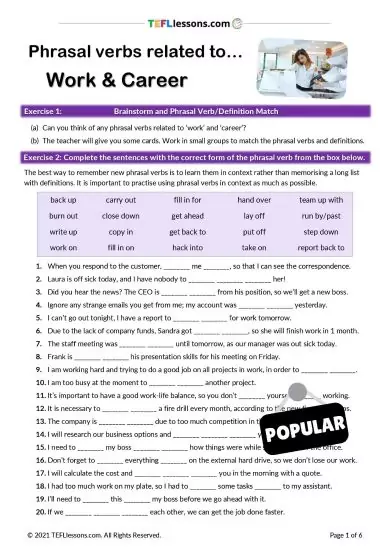
2. Introduce phrasal verbs to lower-level students with the use of visual aids.
Basic phrasal verbs such as get up and sit down can and should be introduced to lower-level students. Using visual aids such as pictures, diagrams, videos, or gestures can be particularly useful when illustrating the meaning of phrasal verbs to lower-level students.
- Resource s: The following handout (free) and basic phrasal verbs lesson plans (pay to download) all utilize images for introducing the grammar rules for using phrasal verbs. Download them here: 50 Common Phrasal Verbs , Basic Phrasal Verbs (1) , and Basic Phrasal Verbs (2) .
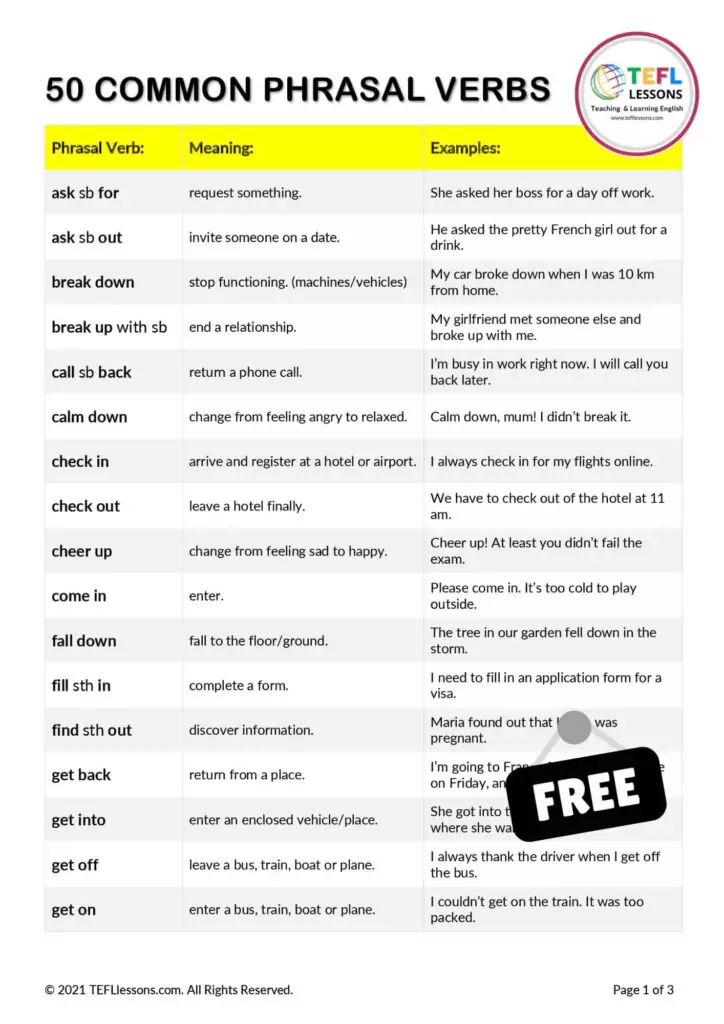
3. Introduce phrasal verbs based on certain themes.
Examples of themes for introducing phrasal verbs include emotions, work, travel, and so on. This method helps learners organize and categorize the verbs, making them easier to remember and use correctly.
- Resource : The following free resource focuses on phrasal verbs related to holidays and travel. Download the lesson plan: Phrasal Verbs Related to Holiday and Travel .
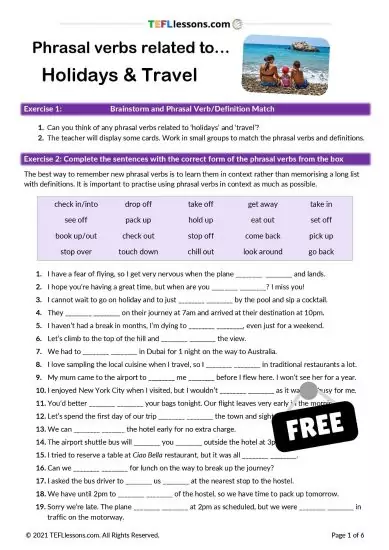
4. Provide examples in context.
By encountering phrasal verbs in meaningful contexts, students are more likely to remember them and use them appropriately. Materials that include phrasal verbs used in context, such as dialogues, listening comprehension exercises, and reading texts, are all helpful. You should encourage learners to guess the meaning of each phrasal verb based on context clues or familiar words. Authentic materials such as movie clips, songs, news articles, and podcasts that feature phrasal verbs are also great options for providing context for higher-level students.
5. Use a variety of exercises when teaching a set of phrasal verbs.
In addition to facilitating understanding, using a variety of exercises provides the repetition required to help your students memorize phrasal verbs. You could start by asking the students to try to guess the meaning of phrasal verbs highlighted in a reading text or dialogue; next, they might match these same phrasal verbs to definitions provided; then, they could do an exercise where they need to fill in the gaps in sentences with the correct phrasal verb or the correct particle.
- Resource: For a phrasal verb lesson plan that follows the above pattern, check out the following resource: Phrasal Verbs Related to Crime and Punishment .
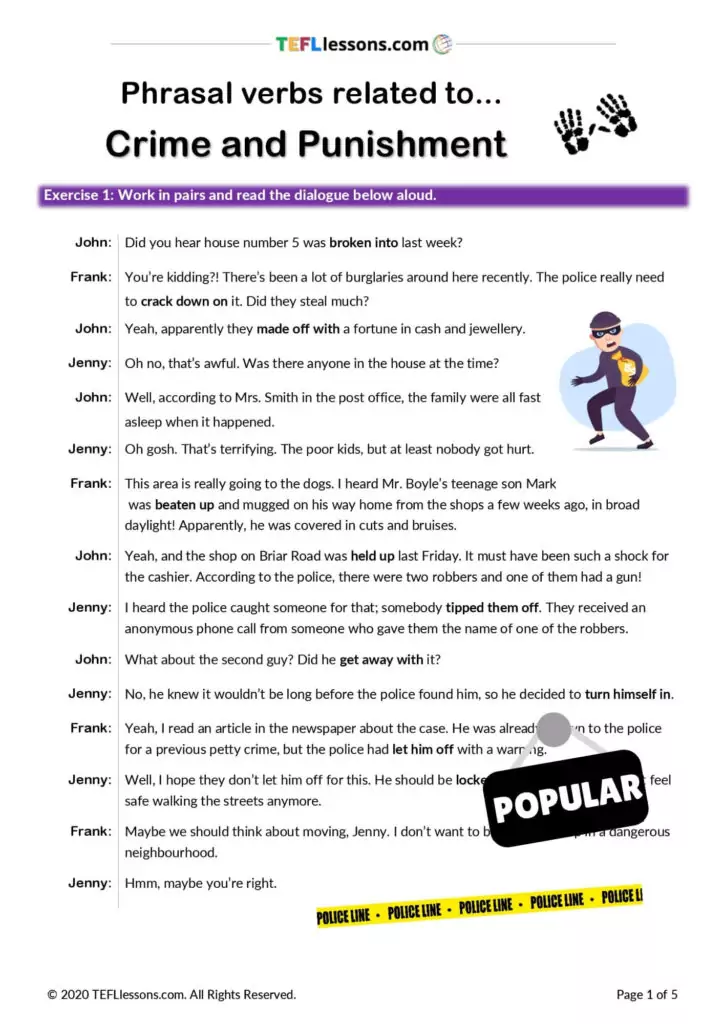
6. Provide lots of opportunities for practice and production.
It’s essential that once students have been introduced to a set of phrasal verbs, they are given sufficient time to practice them in a variety of ways. This might include speaking tasks like role-playing activities that simulate real-life situations where phrasal verbs are commonly used or conversation questions that feature phrasal verbs. Written practice might include simple sentence creation or writing a dialogue or paragraph that incorporates a given set of phrasal verbs. Practice activities that relate to the students’ own experiences, interests, or goals are especially useful, as personalization makes the learning process relevant and more meaningful.
7. Utilize games, puzzles, and quizzes.
In addition to the practice exercises mentioned above, charades, crossword puzzles, word searches, and quizzes are all excellent ways to practice and review phrasal verbs while bringing an element of fun into the classroom.
- Resources: Check out the following phrasal verb games and puzzles: Common Phrasal Verbs Crossword (B1) , Phrasal Verbs (Act or Explain) , and Phrasal Verbs Board Game .
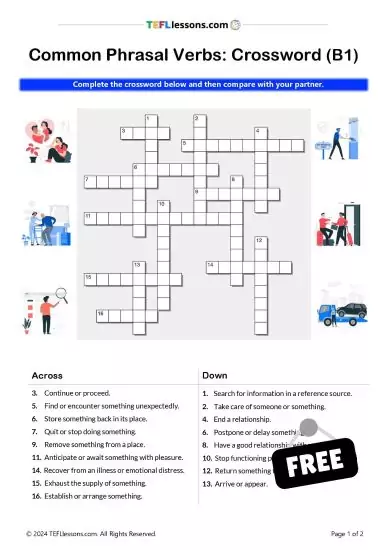
8. Spend sufficient time focusing on use when you encounter a new phrasal verb.
When you come across a new phrasal verb in the course of a lesson, it is not enough to simply provide a definition. You should always model a few examples that demonstrate appropriate usage and make the students aware of the grammar rules. E.g., Is it a separable or inseparable phrasal verb? Is it transitive or intransitive?
9. Don’t overwhelm your students by introducing too many phrasal verbs at once.
In general, around 5-10 phrasal verbs per lesson for beginners or elementary students is plenty. At higher levels, you can increase the quantity, but always make sure that you are providing ample opportunities for practice, reinforcement, and review.
10. Make time in class for error correction.
This is particularly important at lower levels. Common errors include separating an inseparable phrasal verb, confusing phrasal verbs that have the same main verb but different particles, and using a phrasal verb in an inappropriate context. In order to help students overcome these errors, you should use on-the-spot correction during writing and speaking activities. It’s also helpful to make a note of errors the students make during a class activity. You can transfer any sentences containing errors to the board, and then have students discuss each sentence in pairs and try to identify the errors. Finally, elicit students’ ideas before highlighting errors and explaining correct usage with examples in context to reinforce learning.
11. Encourage learning and reflection outside of class.
Reading, watching films or TV series, and listening to podcasts in English will allow your students to encounter phrasal verbs in natural contexts. Suggest that your students keep a notebook, where they can record any phrasal verbs they come across inside or outside of the classroom, along with their meanings, contexts, and example sentences. Finally, recommend using phrasal verb apps for extra practice.
At TEFLlessons.com , you can access a plethora of useful phrasal verb lesson plans and worksheets. Register for a free account to download more than 100 free resources !
Get 20% off a 12- or 6-month membership to TEFL Lessons with the promo code INTRO20 and access the TEFL Lessons library of 460+ ESL teaching resources.
Our diverse, global community of contributors includes experts in the field, Bridge course graduates, online and classroom-based teachers worldwide, and Bridge faculty and staff.
Restaurant Globus

RESTAURANT GLOBUS, Elektrostal - Restaurant Reviews & Photos - Tripadvisor
France tries to shed its rude reputation ahead of the Olympics
Is the unfriendly Parisian a myth? A local goes undercover as a tourist to find out.
Paris is in the home stretch of preparing for the Olympics. A new 8,000-capacity arena has been opened in the north of Paris, the Olympic Village was inaugurated by Emmanuel Macron in early March, and authorities are still desperately trying to make sure the Seine is swimmable by the summer. The country is slowly but surely getting ready for the more than 15 million visitors that will descend on the capital and its suburbs between July and August. But there’s still something to consider — something a bit less tangible.
Are Parisians ready to welcome these visitors? Like really welcome?
France gets a bad rap when it comes to friendliness. There’s, of course, the long-standing cliché of the snooty French waiter or the surly Parisian, and a viral TikTok earlier this year of an American woman tearfully telling the camera that traveling in France was “isolating” and that French people were unwelcoming got thousands of comments — many from people agreeing with her.
“This kind of bad PR doesn’t worry me because it’s anecdotal,” says Corinne Ménégaux, the head of the Paris tourism office. “I think maybe 15 or 20 years ago the French were less welcoming, but nowadays we’ve got past that cliché. You inevitably have a small percentage of people who aren’t nice, and there’s not much you can do about it. It’s a reality of big cities, just like in London or New York.”
That hasn’t stopped France trying to clean up its rude image before foreigners come to town. Last year, the regional chamber of commerce updated a decade-old hospitality campaign called “Do You Speak Touriste? ” in the run-up to the Rugby World Cup held in Paris. The official guide touched on cultural differences, gently reminding the French that “The cultural tendency in France is to openly show one’s emotions, through one’s gestures or tone of voice. […] In other countries, disagreement is expressed a lot less openly.”
“There’s still the cafe waiter who doesn’t speak to you and sullenly serves you a Coca-Cola for 15 euros. I’m not saying that doesn’t exist anymore. But we have seen a real improvement,” said Frédéric Hocquard, the city councilor responsible for tourism and nightlife in Paris. He says that the covid-19 pandemic was the great turning point.
“There was this period when we had no tourists at all. And the tourist industry realized it had to make a bit of effort.”
A friendliness pledge
Part of Paris’ effort to revamp its reputation is a “hospitality charter,” which has been signed by more than 1,600 businesses in the tourism sector, from hotels to restaurants to tour guides. The agreement is based around three main principles: promote sustainable and environmentally friendly measures; make visitors’ experiences more fluid; and support local businesses. Businesses that have signed up will be able to display a sticker or sign on their establishment so that tourists know that they’re a trusted place. The city is also training workers in newspaper kiosks, bakeries and tobacco shops to be able to answer tourists’ questions.
Both Ménégaux and Hocquard agree on one point: Visitors to Paris also have to do their part. . In an ideal world, Ménégaux would like tourists to sign a “good tourist etiquette” charter of their own. “When people come to Paris, we want them to commit to respecting certain things: to respect their neighbors’ peace and quiet, to use a reusable water bottle and not buy plastic ones and not to buy products made in China when you can buy local.”
Differences in etiquette are among the first things some foreigners notice when they move to or visit France. American expats and social media content creators Ember Langley and Gabrielle Pedriani devoted a video to the thorny issue of French politesse in their lighthearted TikTok series, “The ABCs of Paris.” In the video , Langley warns, “What’s considered polite in the U.S. might not be considered polite in Paris.” The two go on to give tips such as “Smile less”, “Get into a debate over dinner” and “Arrive fashionably late.”
“I see Americans in the Metro and it’s like — read the room. Everyone else is being quiet!” Langley said in an interview. “When you’re a traveler, and you’re coming here on vacation, it’s easy to forget that 2 million people are living their lives here. You need to be respectful of the local culture and approach your interactions humbly.” But Langley says it’s a misconception that the French are rude; it’s just a matter of cultural differences. “The biggest thing here is that the customer is not always right; in the U.S., the customer is king.”
Going undercover as an English-speaking tourist
I decided to put Parisians’ friendliness to the test myself. As a Brit who has lived in Paris for a decade, speaks French and has even obtained French nationality (with immense gratitude), I put on my best British accent and went to see how I was treated around the French capital.
The experiment began at ground zero: in front of Notre Dame cathedral, which is still blocked off and undergoing renovation work after an enormous fire engulfed the roof in 2019. With a friend, I headed into the archaeological museum in the crypt. “Hello! Parlez-vous anglais?” I asked the woman behind the ticket desk. I was greeted with a broad smile and patient description — in English — of the museum and ticket prices. She wasn’t even bothered by a patently stupid question about whether we could visit the cathedral, gently explaining that the site wouldn’t be open to the public for months.
We thanked her and headed back up into the sunlight.
Next stop: a bouquiniste. These Seine-side booksellers have to tackle tourist questions day in, day out. The man running his stall opposite the cathedral cheerfully took the time to find books in English for us, before recommending that we try Shakespeare and Company just across the road, one of Paris’s most famous English-language bookstores. It was the same at the tourist trinket shop, where we asked for directions to the Eiffel Tower or down in the Metro station, where the woman behind the counter told us that her English wasn’t very good and yet valiantly answered all of our questions about transport passes with broken but determined English.
By this point, I had even ditched my poorly-pronounced French icebreaker, just bouncing up to them and speaking directly in English. And yet everywhere we went, we were greeted with smiles and a genuine desire to help. I’ll admit that I was surprised — it’s been years since I was a tourist in the city, but I certainly remember eye-rolling, terseness and a certain unwillingness to help.
It was time for the ultimate test: asking for oat milk in a Parisian cafe. We chose a touristy spot on the Place Saint-Michel, where the servers were every inch the stereotype, in white shirts and black bow ties. Our server swept up to us haughtily but didn’t blink when we responded in English, even though he initially couldn’t understand my question. “Hot milk?” he kept repeating. When he finally understood, he laughed, waving his hands dismissively. “ Non, non , it is not possible, soy milk, vegan milk, we do not have, only la vache .” To make his point, he added with a flourish, “Moooo!”
My request had managed to elicit the famous “ c’est pas possible ” — well-known to anyone who has struggled with French bureaucracy and customer service — but it was said with such good humor (and a complementary animal sound), so how could I be offended?
The more than a dozen tourists I spoke to had also had largely positive experiences. Samantha Capaldi, visiting from Arizona with two friends, told me, “We love it here,” before admitting with a wry smile, “We’re trying to blend in but we’re so loud, everyone notices us.” In the four days they’d spent in Paris, they’d observed the same cultural differences Langley mentions in her videos — such as not getting tap water automatically with your meal at a restaurant, or being given a funny look when ordering an appetizer alongside an entree. “They kind of laugh at us, but not in a mean way,” she continued. “Trying to speak French helps a lot.”
Carla, from Sheffield in the United Kingdom, was in Paris with her boyfriend Brian to celebrate the anniversary of their first date. She’s visited Paris several times and has noticed a marked difference in the way she’s been treated compared to previous trips. “I’m a bit of a weightier person and I’ve been deliberately ignored in restaurants before — other people being given menus before me or served before me. But I rarely get that now. Everyone seems really nice.”
It seems that the city’s efforts in recent years are paying off and Parisians are — dare I say it? — learning that a little hospitality goes a long way. The only thing left is being able to get oat milk in cafes — but maybe it’s up to Americans to let that go and lean into France’s love of dairy. Mooo!
Catherine Bennett is a writer based in Paris.
More travel tips
Vacation planning: Start with a strategy to maximize days off by taking PTO around holidays. Experts recommend taking multiple short trips for peak happiness . Want to take an ambitious trip? Here are 12 destinations to try this year — without crowds.
Cheap flights: Follow our best advice for scoring low airfare , including setting flight price alerts and subscribing to deal newsletters. If you’re set on an expensive getaway, here’s a plan to save up without straining your credit limit.
Airport chaos: We’ve got advice for every scenario , from canceled flights to lost luggage . Stuck at the rental car counter? These tips can speed up the process. And following these 52 rules of flying should make the experience better for everyone.
Expert advice: Our By The Way Concierge solves readers’ dilemmas , including whether it’s okay to ditch a partner at security, or what happens if you get caught flying with weed . Submit your question here . Or you could look to the gurus: Lonely Planet and Rick Steves .

Expedia Rewards is now One Key™
Elektrostal, visit elektrostal, check elektrostal hotel availability, popular places to visit.
- Electrostal History and Art Museum
You can spend time exploring the galleries in Electrostal History and Art Museum in Elektrostal. Take in the museums while you're in the area.
- Cities near Elektrostal

- Places of interest
- Yuri Gagarin Cosmonaut Training Center
- Central Museum of the Air Forces at Monino
- Peter the Great Military Academy
- History of Russian Scarfs and Shawls Museum
- Balashikha Arena
- Ramenskii History and Art Museum
- Balashikha Museum of History and Local Lore
- Bykovo Manor
- Pekhorka Park
- Malenky Puppet Theater
- Drama Theatre BOOM
- Likino Dulevo Museum of Local Lore
- Pavlovsky Posad Museum of Art and History
- Saturn Stadium
- Noginsk Museum and Exhibition Center
- Fairy Tale Children's Model Puppet Theater
- Fifth House Gallery
- Church of Vladimir
- Malakhovka Museum of History and Culture
- Orekhovo Zuevsky City Exhibition Hall

IMAGES
VIDEO
COMMENTS
21 Making Alternate Plans. 22 Shopping for Souvenirs. 23 Trying to Find a Doctor. 24 Losing the Wallet and Passport. 25 Being Cautious in a Big City. 26 Local Customs. 27 Shuttle Bus at the Airport. 28 Arriving Home. 28 Conversations on topic TRAVEL for English learners to practice speaking English.
Travel conversation questions 2 Before starting the discussion with this second set of questions, be sure the students are familiar with the terms - landscape, ecotourism, issue (problem), journey, baggage, and souvenir.
Travel is also an amazing reason to improve your English. This was Andrea's goal to help her improve, and she achieved English fluency in 6 months! Want to get some practice speaking English before your vacation? Try a few sessions with a Preply English tutor or discover the Preply business trip English lessons. You can practice all the ...
The 3 following ESL travel conversation exercises will help you get better at using English to have a conversation about traveling. Exercise 1 - Fill in the Blanks In this ESL travel conversation exercise you need to choose the correct option (A-D) to fill in each of the blanks in the following conversation.
These 61 questions about travel can be used as an English conversation practice - letting you work on your speaking and vocabulary! Car trip questions Travel questions: A good way to boost our English fluency! ... Related: 61 Hypothetical Questions For ESL: Native English Speaking Practice. Questions about travel: Travel likes and dislikes ...
A list of questions you can use to generate conversations in the ESL/EFL classroom. Conversation Questions Travel A Part of Conversation Questions for the ESL Classroom. Related: After a Vacation, Holidays. Have you ever been abroad? Where have you been?
This free ESL lesson plan on travel has been designed for adults and young adults at an intermediate (B1/B2) to advanced (C1/C2) level and should last around 45 to 60 minutes for one student. ... The focus in the class is on conversation in order to help improve students' fluency and confidence when speaking in English as well as boosting ...
Airport English Conversation #3: On the plane. The people who work inside the airplane serving food and drinks are called flight attendants. Both men and women who have this job are called flight attendants. Listen to this conversation that Dan has with the flight attendant when dinner is served on the flight. 00:00.
Travel English Phrases. English is essential for communication in most countries. Wherever you are going, you need to have a good grasp of the basics of the language to get around and communicate at the airport, hotel and everywhere in between. This post has dozens of travel English phrases to help you navigate any foreign country.
An ever-popular topic among students of all levels. This lesson focuses on developing fluency through a range of discussion questions, such as "How important is it for young people to visit other countries?" Ready-to-go conversation-based worksheets about travel - for ESL students. With Teachers Notes and answers.
AT THE HOTEL 1: Checking in. AT THE HOTEL 2: Checking in. AT THE HOTEL 3: Getting from the hotel into the city. AT THE HOTEL 4: Talking to someone at the reception desk. AT THE HOTEL 5: Making a reservation. AT THE HOTEL 6: Asking directions. AT THE HOTEL: Talking about what you like/don't like.
Travel Conversation Dialogues in English. Traveling exposes one to new sights, emotions, and experiences. Outings teach you a lot of things and modify your view on life. If you are fluent in English, you can go anywhere in the world and make many new acquaintances. Learn travel conversation dialogues as well as travel terminology to spice up ...
ESL Conversation Lesson Questions: Free classroom handouts. English lesson on TRAVEL. Use for debates, discussions, speaking, conversations, independent learning and more.
Vocabulary and expressions to talk about travel. A powerful resource for learning or teaching English to talk about a holiday, explain a trip, talk about whe...
Our travel English lessons are listed by published date with the newest lessons first. BEP 295 - Business Trip 4: Factory Inspection. BEP 294 - Business Trip 3: Confidential Discussion. BEP 284 - Business Trip 2: Giving Directions and Getting Around. BEP 283 - Business Trip 1: Taking a Taxi.
70 travel conversation questions to practice your English. Practice your English speaking skills with these fun questions about travel. Use this list of travel conversation questions to help your students practice their English speaking skills. Almost everyone has a strong opinion or two on travel. Whether they love to travel by plane, train ...
Minimalist Travelling. The students are going to practice the use of some basic vocabulary including traveller's essentials. 249 uses. A selection of English ESL travel video quizzes.
30 Brilliant Conversation Starters for the ESL Classroom; 70 School Conversation Questions; 100 Great Health Conversation Questions; 32 Immigration Discussion Questions; Friends Conversation Questions; ESL Conversations: 50 Conditional Questions; If there are travel conversation questions that you would like me to add, send them via Facebook ...
File previews. pptx, 9.2 MB. **This ESL lesson aims to help learners develop their vocabulary related to buying a train ticket, including understanding common phrases and language used in this context, such as ticket types, travel dates and times, and payment methods. Learners will also practice speaking skills, including asking for and giving ...
How to teach phrasal verbs to ESL learners: 11 effective strategies and resources 1. Stress the importance of learning and using phrasal verbs. Phrasal verbs are a fundamental component of the English language and are used extensively in daily conversation, as well as in literature, newspapers, magazines, and online content.
Skip to main content. Review. Trips Alerts Sign in
Machine translation, like DeepL or Google Translate, is a useful starting point for translations, but translators must revise errors as necessary and confirm that the translation is accurate, rather than simply copy-pasting machine-translated text into the English Wikipedia. Do not translate text that appears unreliable or low-quality.
Restaurant Globus. Review. Share. 67 reviews #2 of 28 Restaurants in Elektrostal $$ - $$$ European Contemporary Vegetarian Friendly. Fryazevskoye Hwy., 14, Elektrostal Russia + Add phone number + Add website + Add hours Improve this listing. See all (2)
By Catherine Bennett. May 7, 2024 at 10:35 a.m. EDT. (Illustration by Bertrand Aznar for The Washington Post) 9 min. 1502. Paris is in the home stretch of preparing for the Olympics. A new 8,000 ...
Cities near Elektrostal. Places of interest. Pavlovskiy Posad Noginsk. Travel guide resource for your visit to Elektrostal. Discover the best of Elektrostal so you can plan your trip right.